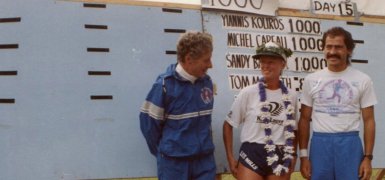The Race of the Century
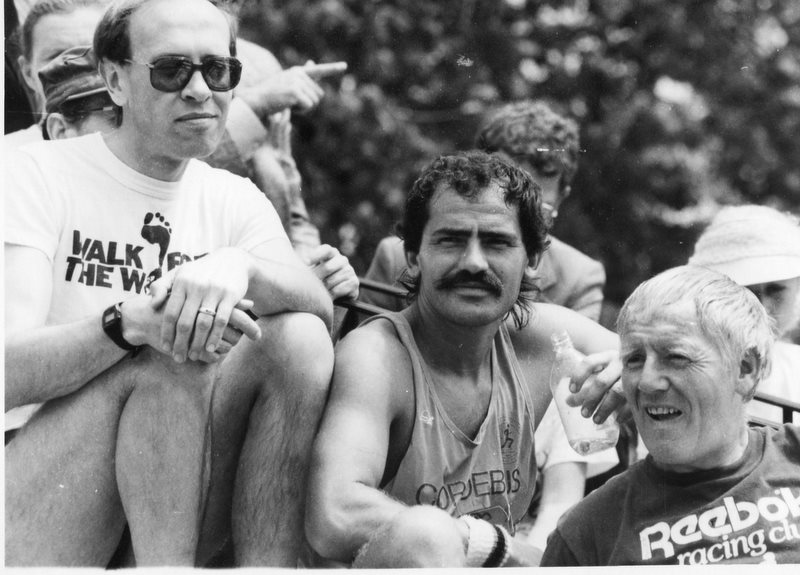 (Malcolm Campbell (founder and president of the IAU). "The IAU 1000 Mile World Championships". The IAU Newsletter, June 1988. Reprinted with permission from the author.)
(Malcolm Campbell (founder and president of the IAU). "The IAU 1000 Mile World Championships". The IAU Newsletter, June 1988. Reprinted with permission from the author.)
" “The Race of the Century” was the title on the press release and this description seemed very appropriate. All runners that had completed 1000 miles in competition were notified of the event and a number of talented multi day runners were also contacted. The success of the race was assured when Yiannis Kouros, that great athlete and sportsman, accepted an invitation to take part. Kouros has style, humor and an appetite for the great occasion. He needs a stage large enough to display his great talent and this was provided in Flushing Meadows, New York.
Photo: Malcolm Campbell (r), Yiannis Kouros (c) and Richard Brown (l) prior to start of the historic IAU 1,000 Mile World Championships.
It was fitting that the organizers should be the Sri Chinmoy Marathon Team. They had successfully staged a 1,000 mile race annually for the last three years and their reputation for attending to the needs of competitors is well known throughout the world. Kouros was to remark after the race that the Sri Chinmoy Marathon Team was probably the only organization in the world capable of staging such an event properly.
The race started on Friday May 20th with eleven experienced competitors. If there is a minority group in ultra distance running it is probably the 1,000 milers and most of these runners have made considerable contributions to the sport during the last few years. In many respects this race was an acknowledgement of these contributions.
The course was on a one mile traffic-free loop and two other races were held in conjunction with the race – a 1,300 mile race with 8 competitors and a 700 mile race with 20 competitors.
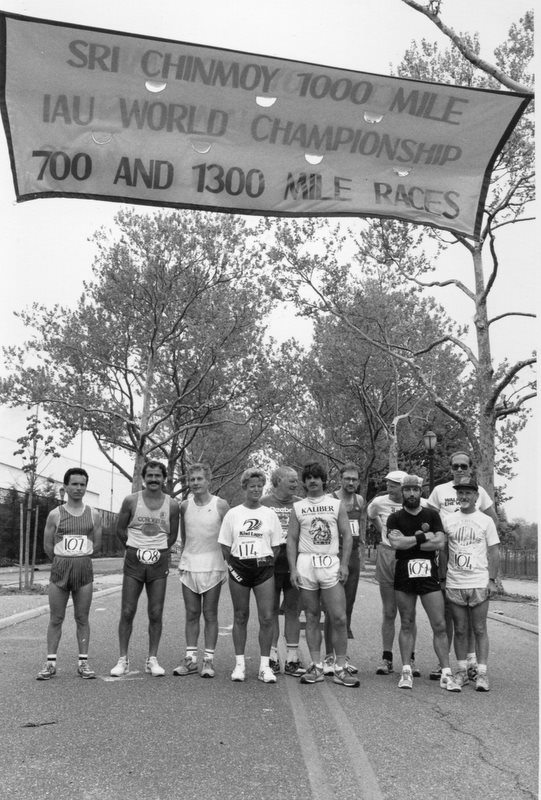 Kouros led from the start. He had indicated that he might start the race at a modest pace and attributed his first day total of 144 miles to the fact that he could not sleep. Five other runners and race walker, John Dowling, managed over 100 miles on that first day, and the lead of this group was French 1000 mile Record Holder, Emile Laharraque with 108 miles. Emile was to run well for about eight days but a re-occurrence of malaria was to give him real problems and prevent his reaching the 12 day cut off point of 700 miles.
Kouros led from the start. He had indicated that he might start the race at a modest pace and attributed his first day total of 144 miles to the fact that he could not sleep. Five other runners and race walker, John Dowling, managed over 100 miles on that first day, and the lead of this group was French 1000 mile Record Holder, Emile Laharraque with 108 miles. Emile was to run well for about eight days but a re-occurrence of malaria was to give him real problems and prevent his reaching the 12 day cut off point of 700 miles.
Photo: the start of the "Race of the Century", the 1988 Sri Chinmoy IAU 1,000 Mile World Championships.The runners, left to right: Gerard Jacquaniello, Yiannis Kouros, Michel Careau, Sandy Barwick, Malcolm Campbell, Tom McGrath, Marvin Skagerberg, John Dowling, Emile Laharaque, Richard Brown and Dan Coffey.
The year was 1888 and the place was New York. George Littlewood completed 623 miles in 6 days setting a world record that was to last for 96 years. Kouros beat that record in New York in 1984 and has passed the mark several times in six similar events. Now in the 'Race of the Century' he was to do so again, setting a new 6 Day Road Record of 639 miles. No other runner has ever beaten George Littlewood’s record.
We had rain, lots of rain, but generally the weather was hot and humid. We were all experienced competitors, however, and the conditions made no appreciable difference to our performances. Some of us would fail to reach the 700 mile cut off point within the time limits but the reasons were probably to do with injuries rather than weather conditions.
Kouros had a few problems on Day 9. Nothing was obviously wrong, but he is not a machine and is subject to all the difficulties encountered in such a race. Where he differs is his refusal to let the difficulties get the better of him. After the race he mentioned that he had problems, but continued until they were solved. Kouros finished the race on Monday night after running for 10 days 10 hours 30 minutes and 35 seconds. He had reduced the previous record set in 1986 by the American, Stu Mittleman, by the incredible margin of 34 hours. The reception Kouros received at the finish can be better imaged than described. The race had received considerable television coverage from a number of countries and at the finish everyone associated with the event, officials and competitors alike, wanted to be at the finish to congratulate him. There is no real way to describe the magnificence of his run. The figures do not tell it all. You would have to be there to appreciate it. Those who took part in this race were truly favoured, and those unable to do so were extremely unfortunate. Those who could have taken part and did not, missed a rare opportunity to witness the performance of the century.
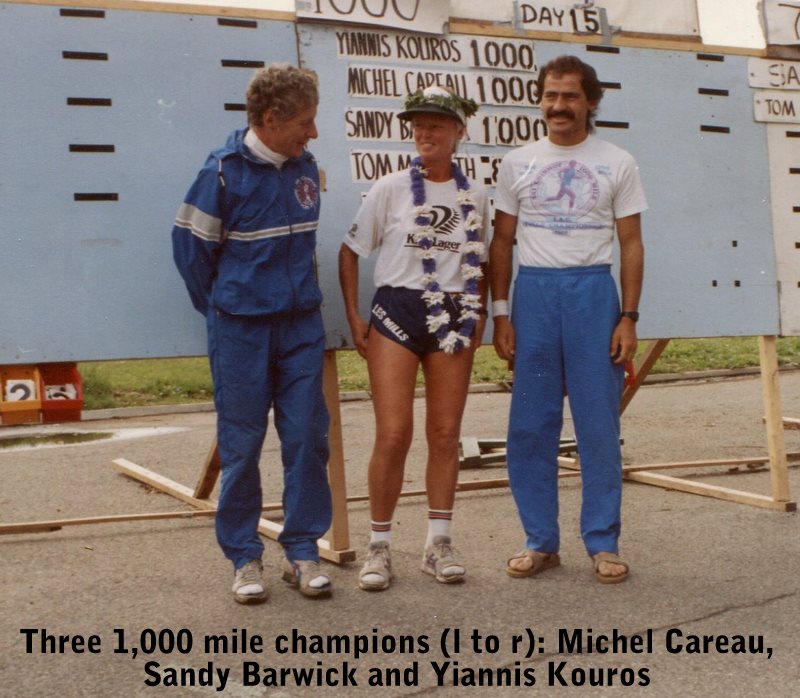 Meanwhile, amongst the mere mortals there was a competitor running one of the greatest performances of his career. Michel Careau has done much to encourage the spread of ultra running in his country. He is a 47 year old Canadian who revels in the challenge of “distance”. He is determined, experienced and extremely courageous. He knew what was necessary: a good basic start followed by days of even paced running. He ran 107 miles on the first day followed by 75 on the second, to set a new Canadian Masters Record for 48 hours. Thereafter, he was to average about seventy miles a day to the finish.
Meanwhile, amongst the mere mortals there was a competitor running one of the greatest performances of his career. Michel Careau has done much to encourage the spread of ultra running in his country. He is a 47 year old Canadian who revels in the challenge of “distance”. He is determined, experienced and extremely courageous. He knew what was necessary: a good basic start followed by days of even paced running. He ran 107 miles on the first day followed by 75 on the second, to set a new Canadian Masters Record for 48 hours. Thereafter, he was to average about seventy miles a day to the finish.
The Canadian media were naturally very interested in Michel’s progress and it was necessary for him to give a number of interviews during the race, but he never lost sight of his target, which was to beat Alan Fairbrother’s time of 13 days, 22 hours. Michel’s finishing time of 13 days 21 hours 31 minutes 53 seconds puts him neatly above Alan in the World Ranking List, and in addition, gives him a new Canadian Masters Record.
One other matter should be mentioned about Michel. He is still improving and well capable of improving his time by the fourteen hours necessary to beat Trishul Cherns. We are likely to see some interesting races in Canada in the near future.
The third placed runner was Sandy Barwick, a charming housewife from New Zealand who completed 100 miles on the first day and went on to reach 461 miles in six days, which beat the World Record set by Christine Barret in the Trentham Gardens Six Day Race a few years ago. Sandy is coached by Richard Tout, the talented New Zealand runner and it became clear that teacher and pupil had done their work well. Sandy seemed to run to a strict schedule which included regular rest breaks. Whilst on the course she would run quite briskly. After six days she set out to average about 60 miles a day which she managed to achieve in a most determined fashion. She will be motivated by the thought of her husband and children flying to New York in time to see her finish. The New Zealand Foreign Minister was also travelling to New York, and when the news of Sandy’s great performance reached him, he also made his way to the finishing line to welcome her. Richard Tout and Sandy Barwick have done much to present a positive image of the sport and are worthy ambassadors for their country. We are certain to hear a lot more of these very talented runners.
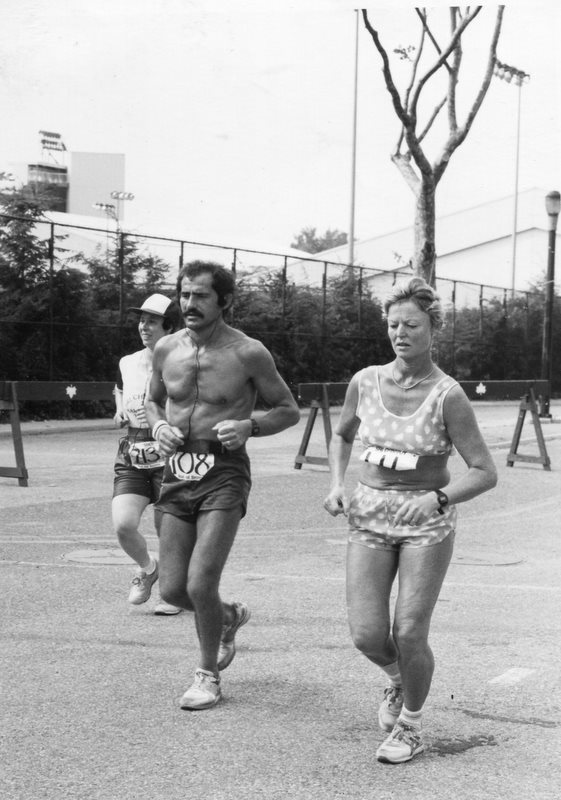 Tom McGrath had a lot of problems – Two Hundred Thousand of them to be precise! This was the amount in dollars be hoped to raise for UNICEF by completing the race. There are a number of problems involved with running 1000 miles and this additional burden was a heavy weight to carry. Tom has the record for running across America and has broad shoulders. There was never any doubt in his mind about finishing. The time limit for the race was 15 days, but when it became evident that Tom would need a little longer, the Sri Chinmoy Marathon Team recorded his laps until the distance was completed.
Tom McGrath had a lot of problems – Two Hundred Thousand of them to be precise! This was the amount in dollars be hoped to raise for UNICEF by completing the race. There are a number of problems involved with running 1000 miles and this additional burden was a heavy weight to carry. Tom has the record for running across America and has broad shoulders. There was never any doubt in his mind about finishing. The time limit for the race was 15 days, but when it became evident that Tom would need a little longer, the Sri Chinmoy Marathon Team recorded his laps until the distance was completed.
Photo: Ultra greats Yiannis Kouros (l) and Sandy Barwick (r) en route to their 1,000 mile world records.
The rest of us were unable to complete 1000 miles for a variety of reasons, and those not mentioned earlier include Richard Brown from London, who set a new British Road Six Day Record of 518 miles before a thigh injury obliged him to retire at 720 miles; Marvin Skagerberg, Dan Coffey, Malcolm Campbell and Gerard Jacquaniello. Well the race is over. The Sri Chinmoy Marathon Team is to be congratulated. We have a World Champion with a World Record. We have a World Masters Champion with a Canadian Masters Record, and we have a Lady World Champion with a World Record. We had excitement, drama, a few tears and moments of great pleasure. It was above all, a demonstration of sporting excellence unparalleled in the history of the sport. It was truly “The Race of the Century” ".
700 Miles
The unique challenge of this race allows the competitors an opportunity to achieve a time for 1,000kms which may well become a standard for ultra races of the future. In the event last year none of the competitors reached 700 miles and the number of finishers in this year’s race is an indication of the rising standards around the world. In this race we would see ladies set National Records for 1,000kms from West Germany, America and Canada. We would also see a new Canadian 6 Day Ladies Record.
Suprabha Schecter from Washington, DC completed 96 miles on the first day ahead of another lady from West Germany – Hildegarde Schmidhuber – who was one mile behind at this stage. These fine runners gradually edged away from the rest of the field with Suprabha running out the winner nine hours ahead of Schmidhuber.
Saurjya Clark, a 49 year old Englishman living in New York, was to finish in third spot a couple of hours ahead of Antana Locs from Canada. Antana had completed 691 miles in the event last year and she was now able to complete the distance with 17 hours to spare and a Canadian Ladies 1,000km Record. Tom Grace from New York had set his sights on finishing the race within the 12 day time limit and did so comfortably.
The Canadian, Barbara McLeod, was the subject of a television programme filmed during the race, and although she was unable to complete the distance of 700 miles because of injury, she completed 393 miles for a new Canadian 6 Day Record.
The number of finishers this year is good evidence of the increase in standards; one can easily forget that 700 miles really is a long way to run. The time limit of 350 miles for 6 days is an indication of the high standard to complete this race, and it is worth recording that Suprabha and Schmidhuber reached 422 miles and 410 miles respectively after 6 days.
1300 Miles
As last year, there would be no finishers in this very demanding race, but like last year another ultra distance star would emerge. Stefen Schlett from West Germany would complete 1,174 miles in 18 days finishing a considerable way ahead of the more experienced runner, Trishul Cherns. En route, Stefen would set new National marks for 1000kms and 1000 miles, and at twenty six years of age we are likely to see very much more of this very strong and determined runner.
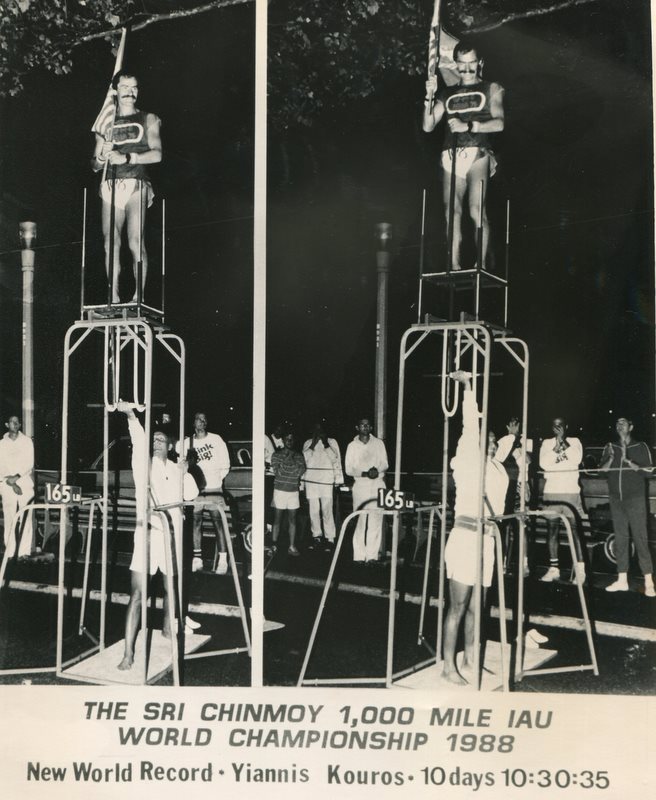 This race included three experienced 1,000 milers who one would have expected to see in the World Championship 1,000 mile race, but the challenge of that extra distance is hard to resist. Nikunja Ebner from Switzerland had a number of injury problems in the race, but was able to persevere past the 1,000kms mark to set a new National mark, and has indicated his intention to tackle the event again next year. The youngest competitor in any of the races was Jesse Dale Riley from Key West, Florida, who is twenty four years old. Jesse, who is a walker, completed 354 miles in six days, and during this time, was able to gain considerable advice from John Dowling who was walking in the 1,000 miler. John remarked after the race that Jesse has a great future in race walking, and I am sure that he is right. At the same time I think that he may well consider walking and running in an ultra event; he certainly has the right temperament for events of protracted duration.
This race included three experienced 1,000 milers who one would have expected to see in the World Championship 1,000 mile race, but the challenge of that extra distance is hard to resist. Nikunja Ebner from Switzerland had a number of injury problems in the race, but was able to persevere past the 1,000kms mark to set a new National mark, and has indicated his intention to tackle the event again next year. The youngest competitor in any of the races was Jesse Dale Riley from Key West, Florida, who is twenty four years old. Jesse, who is a walker, completed 354 miles in six days, and during this time, was able to gain considerable advice from John Dowling who was walking in the 1,000 miler. John remarked after the race that Jesse has a great future in race walking, and I am sure that he is right. At the same time I think that he may well consider walking and running in an ultra event; he certainly has the right temperament for events of protracted duration.
A number of reporters asked the point of the 1,300 miler, and perhaps the point is that no one has yet completed it! For many that is point enough, and it is certain that a number of competitors will line up next year in an attempt to complete the race within the 18 day time limit. It seems equally certain that once this has been achieved, a race of even longer duration will be introduced."
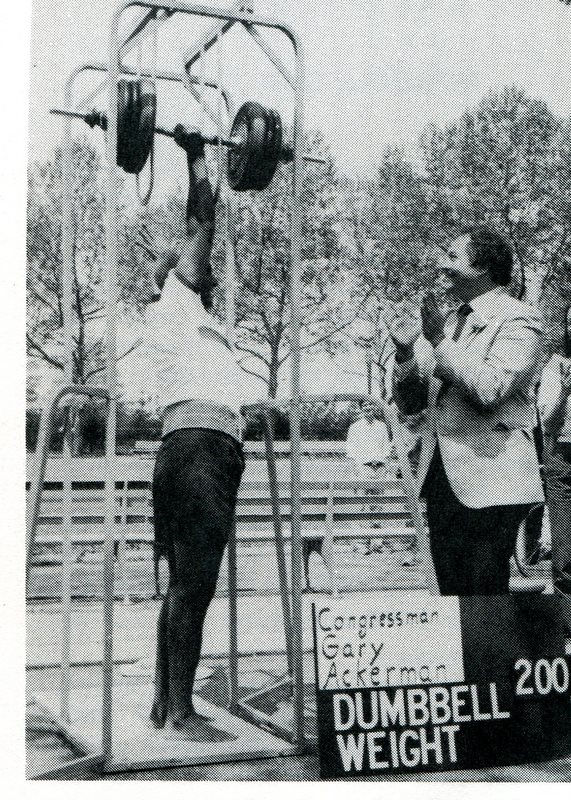
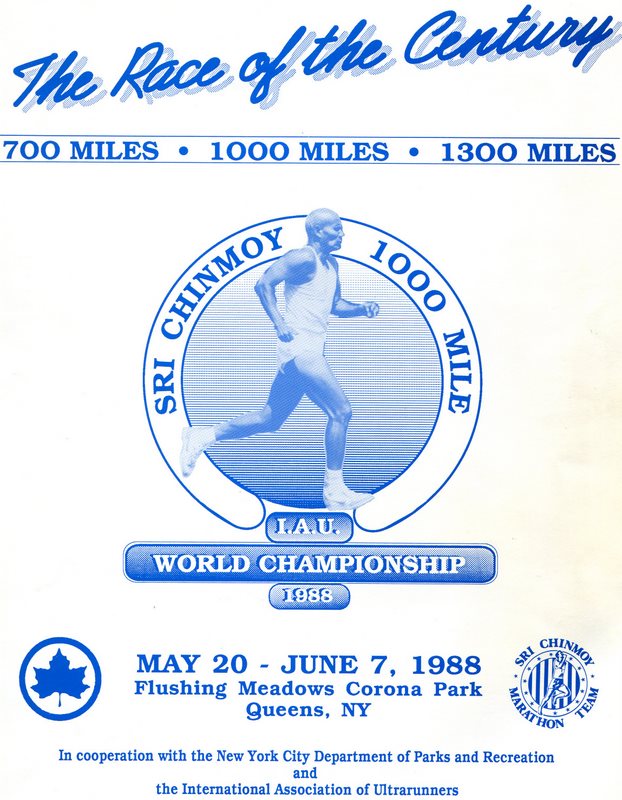 The complete brochure for this historic race including runners bios...
The complete brochure for this historic race including runners bios...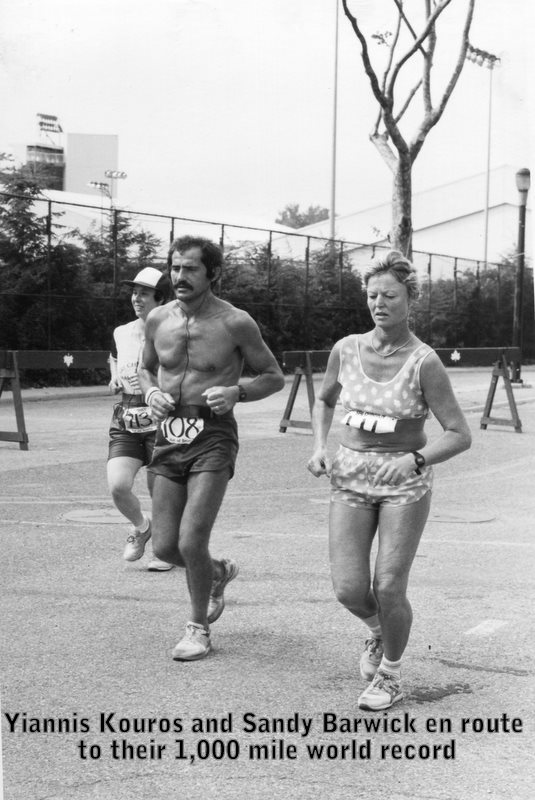 Ultra distance records fell like apples from an autumn tree as a world-ranked crew of distance athletes competed against each other in the 18-day long Sri Chinmoy 1,300 Mile Race. The event was held on a one-mile loop in Flushing Meadows-Corona Park from May 20 to June 7 and included three separate races: 700 miles; the 1,000 mile IAU World Championship and the longest certified race in the world, 1,300 miles.
Ultra distance records fell like apples from an autumn tree as a world-ranked crew of distance athletes competed against each other in the 18-day long Sri Chinmoy 1,300 Mile Race. The event was held on a one-mile loop in Flushing Meadows-Corona Park from May 20 to June 7 and included three separate races: 700 miles; the 1,000 mile IAU World Championship and the longest certified race in the world, 1,300 miles.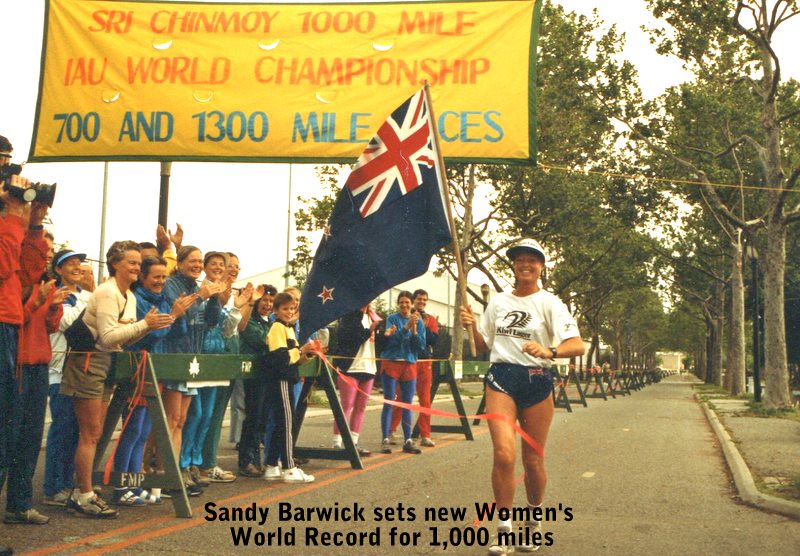 1,000 mile race in 10 days 10 1/2 hours, becoming the 1988 1,000 Mile International Association of Ultrarunners World Champion. The slender, mustached Kouros knocked one and a half days off New Yorker Stu Mittleman's 1986 1,000 mile world record of 11 days 20 hours. Blond, blue-eyed Ms. Sandy Barwick of Aukland, New Zealand became the 1988 1,000 Mile IAU Women's World Champion when she ran the distance in 14 days 20 hours. Ms. Barwick broke by more than 2 days Britain Eleanor Adams' 1,000 mile women's world record of 16 days 22 hours. Canadian diplomat Michel Careau became the IAU Masters World Champion when he finished in 13 days 21 hours, setting a new North American Master's record."
1,000 mile race in 10 days 10 1/2 hours, becoming the 1988 1,000 Mile International Association of Ultrarunners World Champion. The slender, mustached Kouros knocked one and a half days off New Yorker Stu Mittleman's 1986 1,000 mile world record of 11 days 20 hours. Blond, blue-eyed Ms. Sandy Barwick of Aukland, New Zealand became the 1988 1,000 Mile IAU Women's World Champion when she ran the distance in 14 days 20 hours. Ms. Barwick broke by more than 2 days Britain Eleanor Adams' 1,000 mile women's world record of 16 days 22 hours. Canadian diplomat Michel Careau became the IAU Masters World Champion when he finished in 13 days 21 hours, setting a new North American Master's record."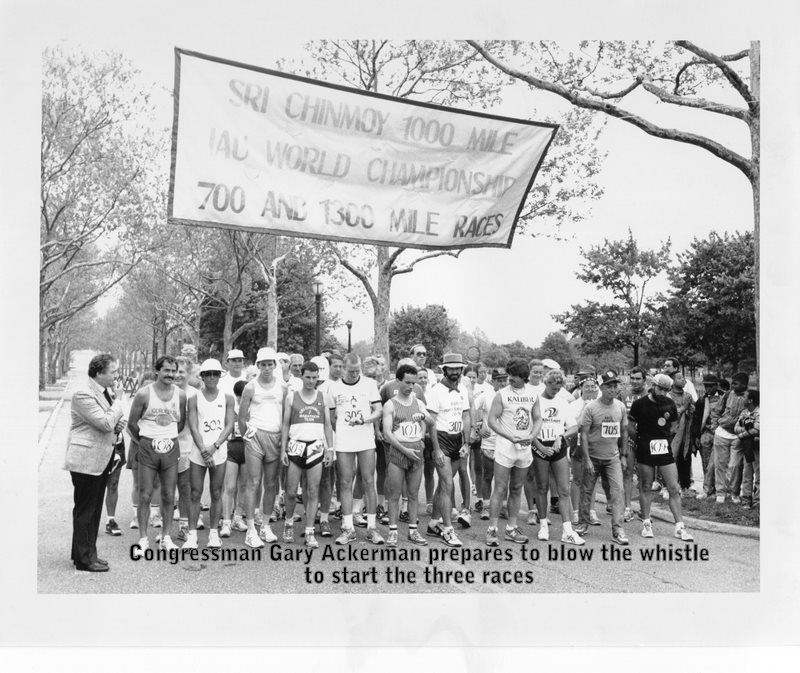

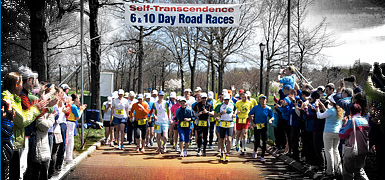
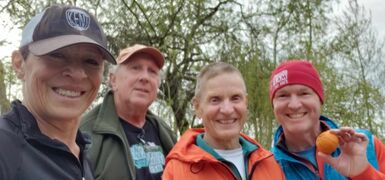
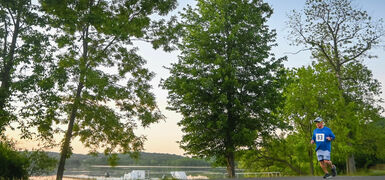

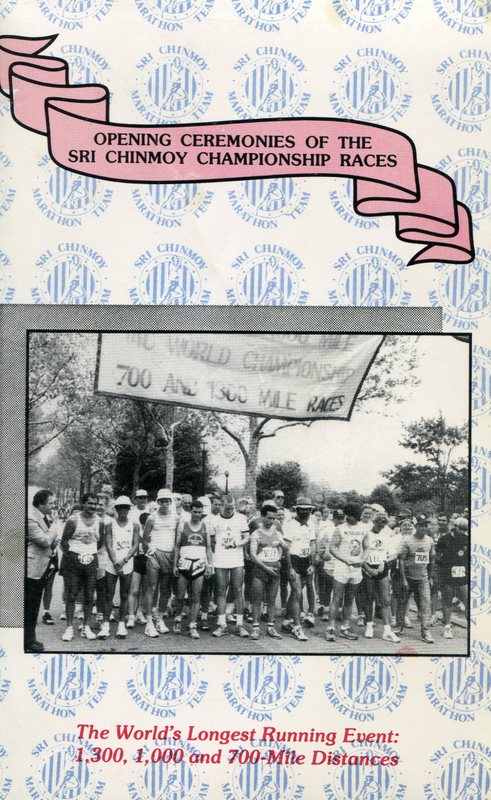

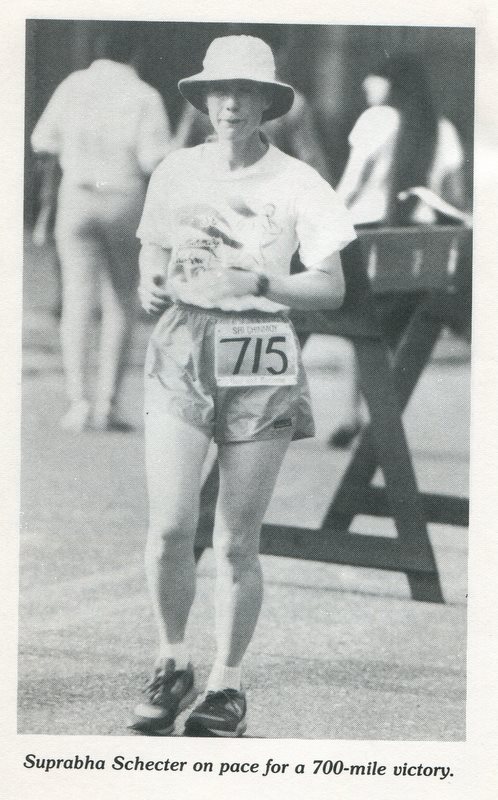
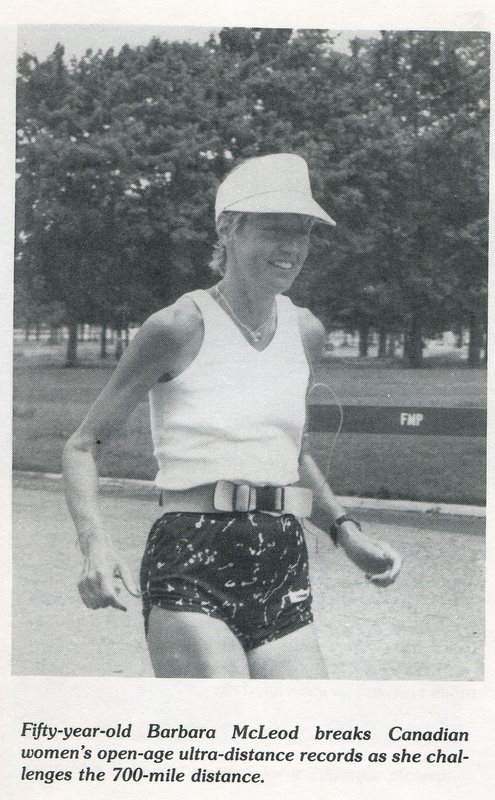
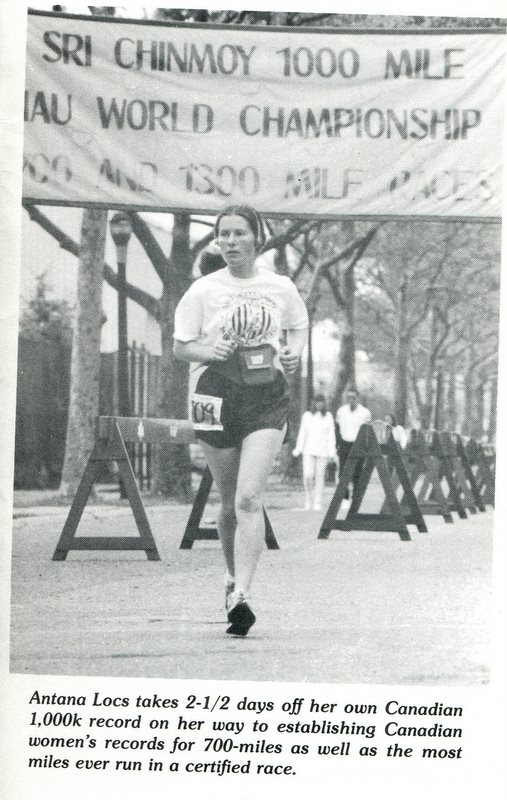
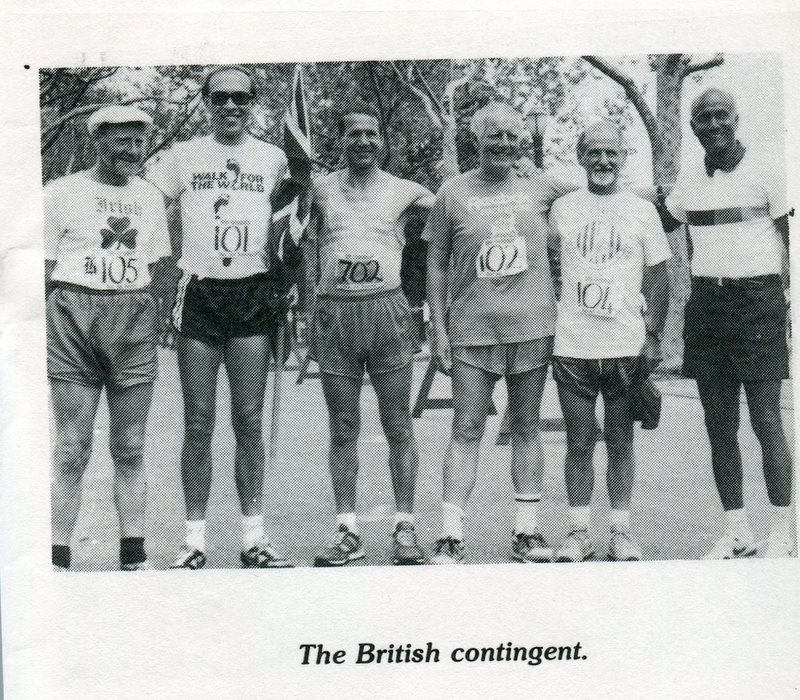
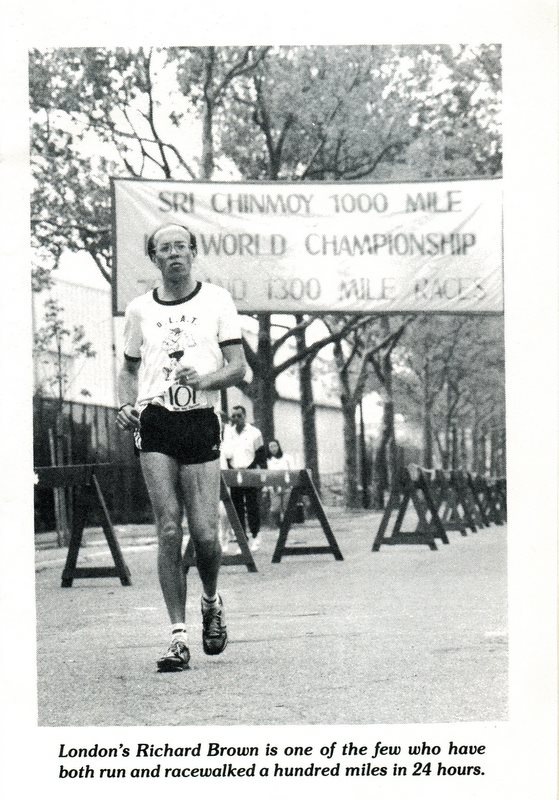
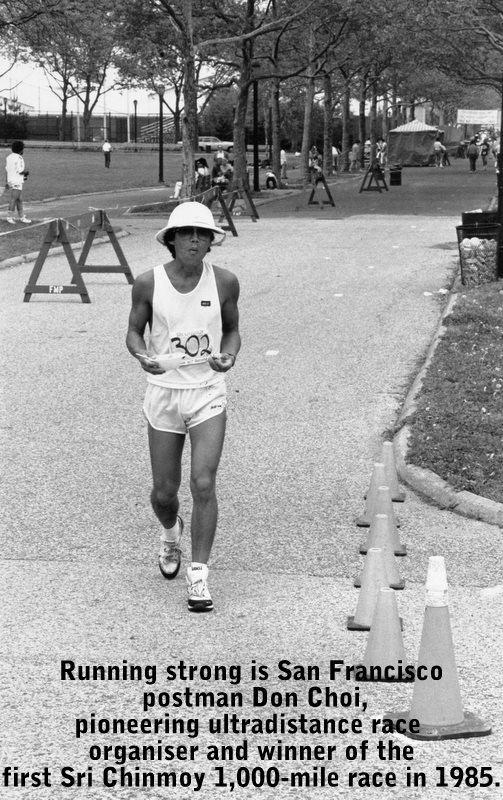
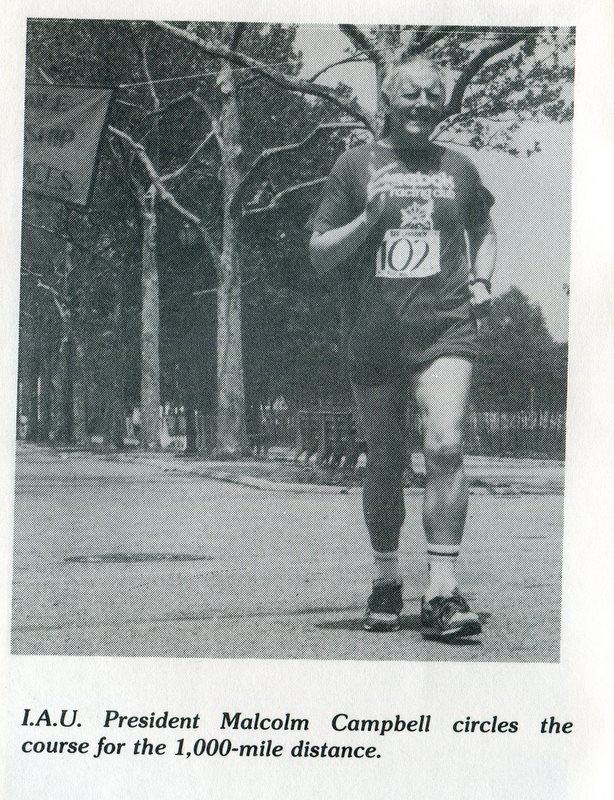
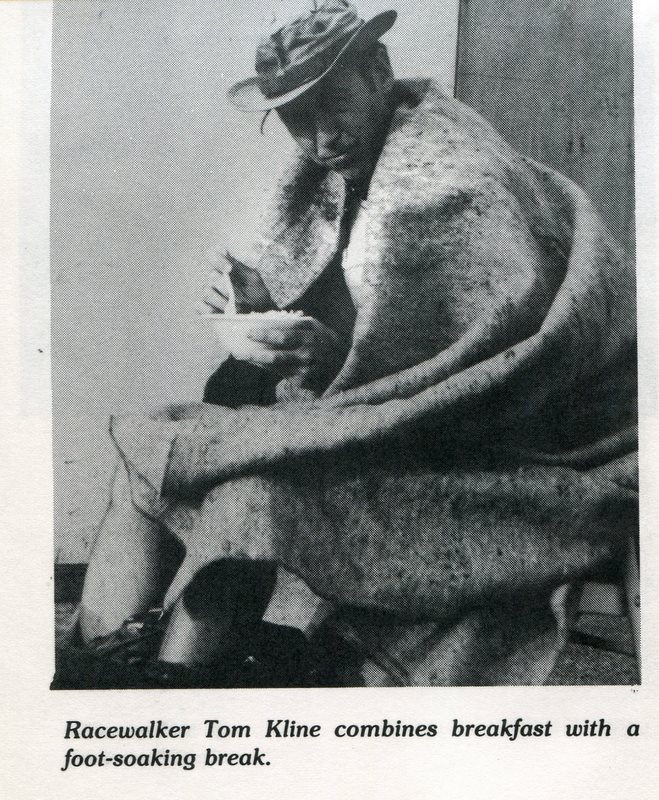
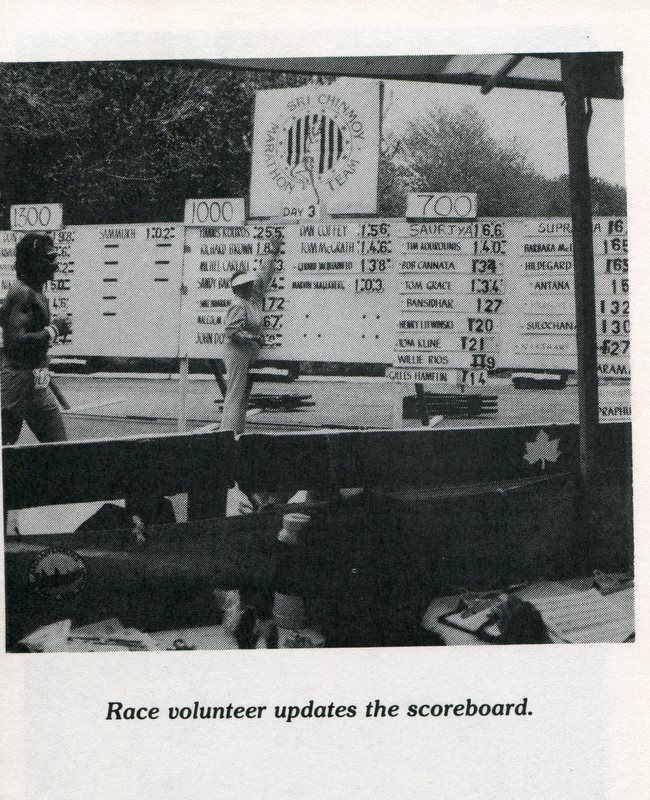
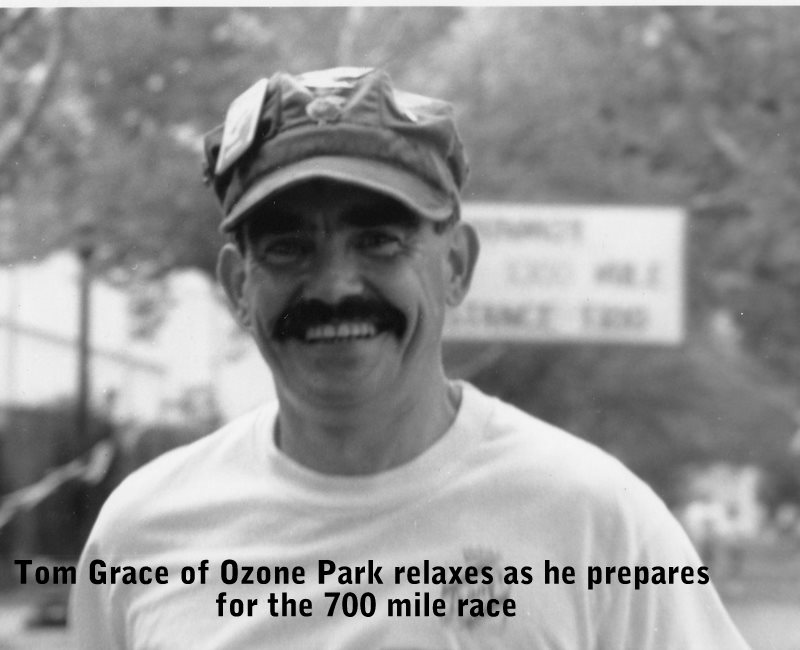
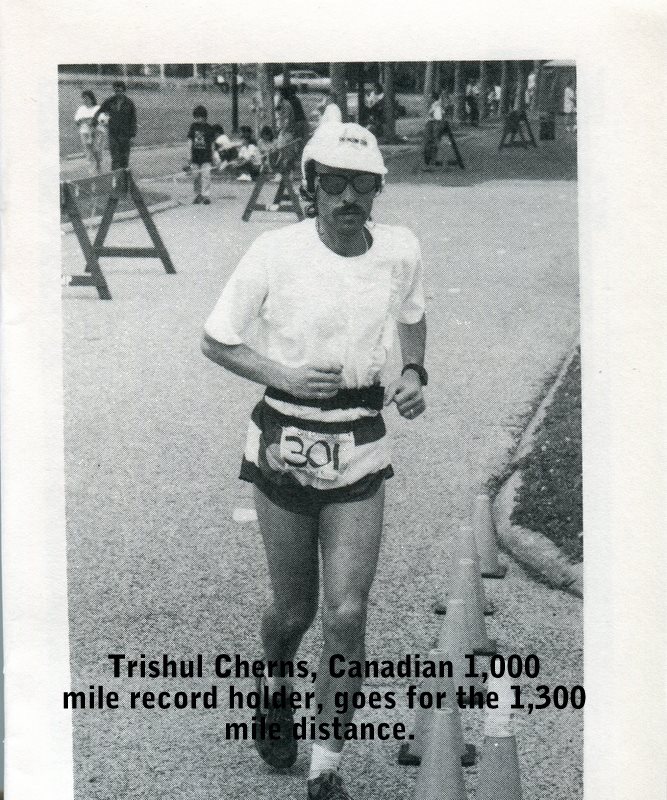
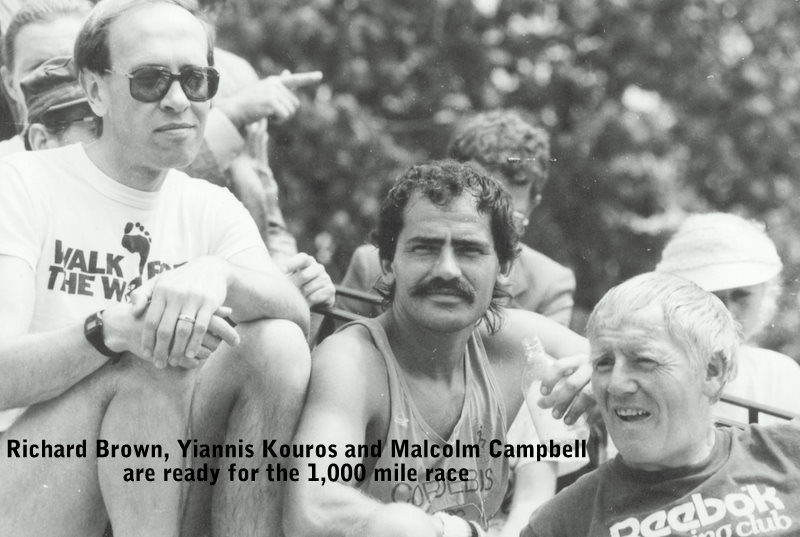
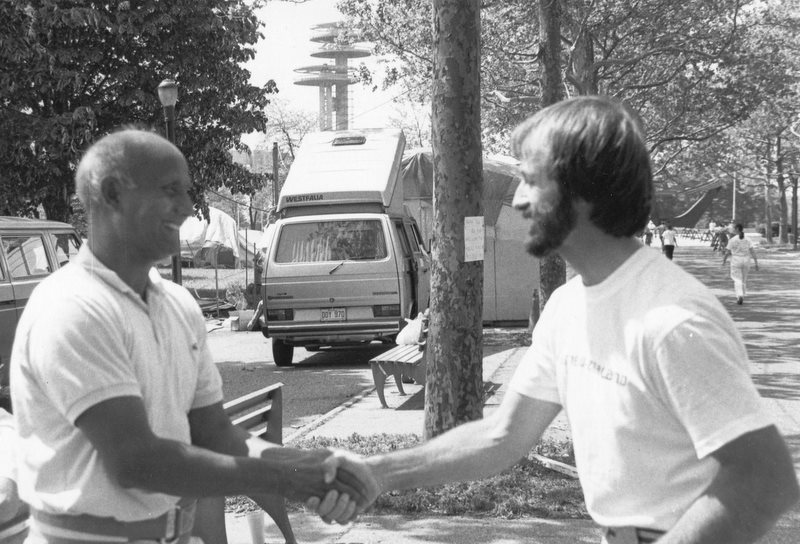
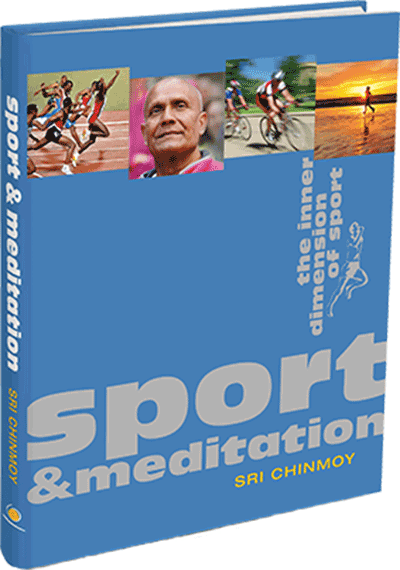
 (Malcolm Campbell (founder and president of the IAU). "The IAU 1000 Mile World Championships". The IAU Newsletter, June 1988. Reprinted with permission from the author.)
(Malcolm Campbell (founder and president of the IAU). "The IAU 1000 Mile World Championships". The IAU Newsletter, June 1988. Reprinted with permission from the author.) Kouros led from the start. He had indicated that he might start the race at a modest pace and attributed his first day total of 144 miles to the fact that he could not sleep. Five other runners and race walker, John Dowling, managed over 100 miles on that first day, and the lead of this group was French 1000 mile Record Holder, Emile Laharraque with 108 miles. Emile was to run well for about eight days but a re-occurrence of malaria was to give him real problems and prevent his reaching the 12 day cut off point of 700 miles.
Kouros led from the start. He had indicated that he might start the race at a modest pace and attributed his first day total of 144 miles to the fact that he could not sleep. Five other runners and race walker, John Dowling, managed over 100 miles on that first day, and the lead of this group was French 1000 mile Record Holder, Emile Laharraque with 108 miles. Emile was to run well for about eight days but a re-occurrence of malaria was to give him real problems and prevent his reaching the 12 day cut off point of 700 miles. Tom McGrath had a lot of problems – Two Hundred Thousand of them to be precise! This was the amount in dollars be hoped to raise for UNICEF by completing the race. There are a number of problems involved with running 1000 miles and this additional burden was a heavy weight to carry. Tom has the record for running across America and has broad shoulders. There was never any doubt in his mind about finishing. The time limit for the race was 15 days, but when it became evident that Tom would need a little longer, the Sri Chinmoy Marathon Team recorded his laps until the distance was completed.
Tom McGrath had a lot of problems – Two Hundred Thousand of them to be precise! This was the amount in dollars be hoped to raise for UNICEF by completing the race. There are a number of problems involved with running 1000 miles and this additional burden was a heavy weight to carry. Tom has the record for running across America and has broad shoulders. There was never any doubt in his mind about finishing. The time limit for the race was 15 days, but when it became evident that Tom would need a little longer, the Sri Chinmoy Marathon Team recorded his laps until the distance was completed. This race included three experienced 1,000 milers who one would have expected to see in the World Championship 1,000 mile race, but the challenge of that extra distance is hard to resist. Nikunja Ebner from Switzerland had a number of injury problems in the race, but was able to persevere past the 1,000kms mark to set a new National mark, and has indicated his intention to tackle the event again next year. The youngest competitor in any of the races was Jesse Dale Riley from Key West, Florida, who is twenty four years old. Jesse, who is a walker, completed 354 miles in six days, and during this time, was able to gain considerable advice from John Dowling who was walking in the 1,000 miler. John remarked after the race that Jesse has a great future in race walking, and I am sure that he is right. At the same time I think that he may well consider walking and running in an ultra event; he certainly has the right temperament for events of protracted duration.
This race included three experienced 1,000 milers who one would have expected to see in the World Championship 1,000 mile race, but the challenge of that extra distance is hard to resist. Nikunja Ebner from Switzerland had a number of injury problems in the race, but was able to persevere past the 1,000kms mark to set a new National mark, and has indicated his intention to tackle the event again next year. The youngest competitor in any of the races was Jesse Dale Riley from Key West, Florida, who is twenty four years old. Jesse, who is a walker, completed 354 miles in six days, and during this time, was able to gain considerable advice from John Dowling who was walking in the 1,000 miler. John remarked after the race that Jesse has a great future in race walking, and I am sure that he is right. At the same time I think that he may well consider walking and running in an ultra event; he certainly has the right temperament for events of protracted duration.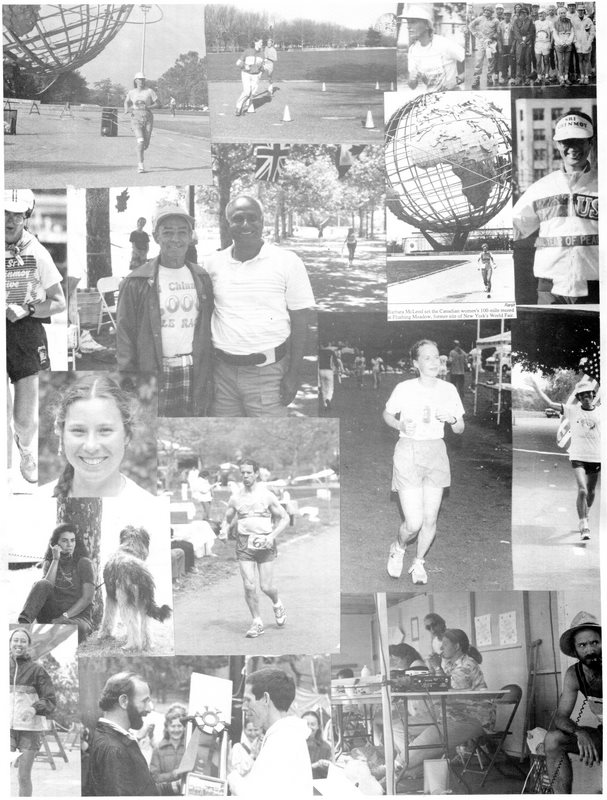
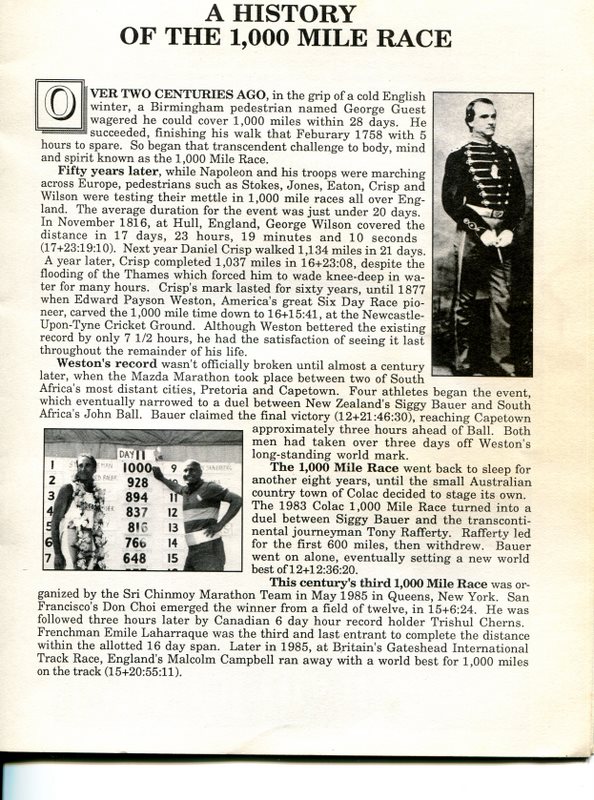
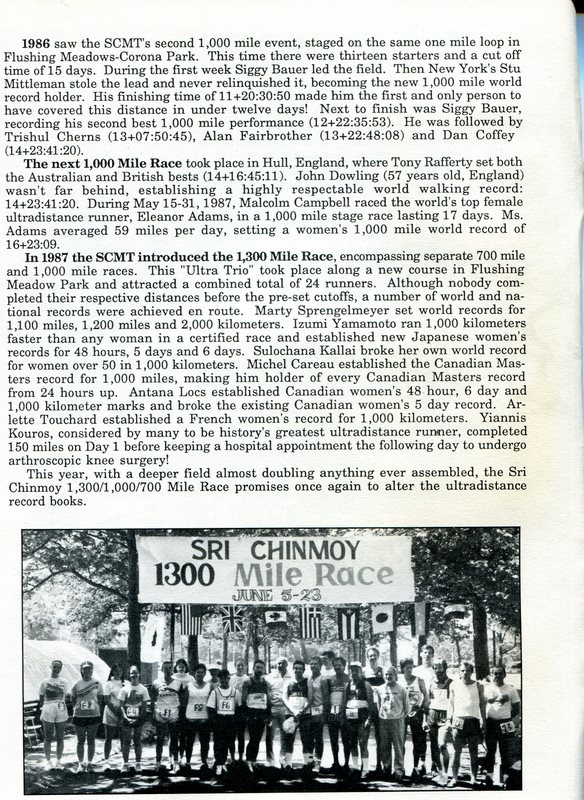
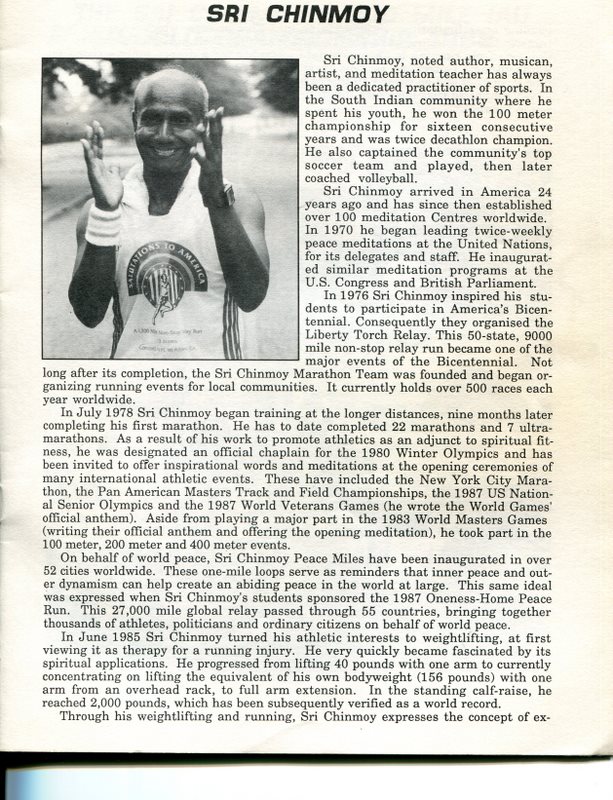
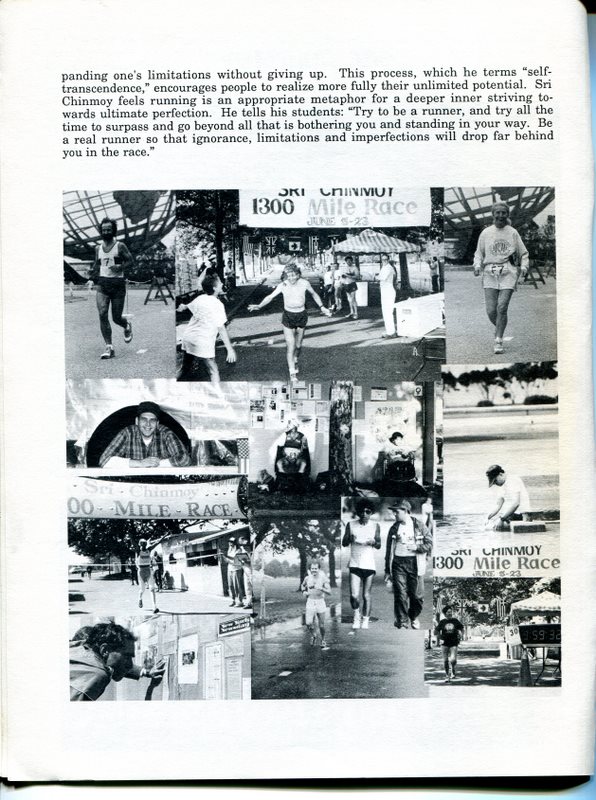
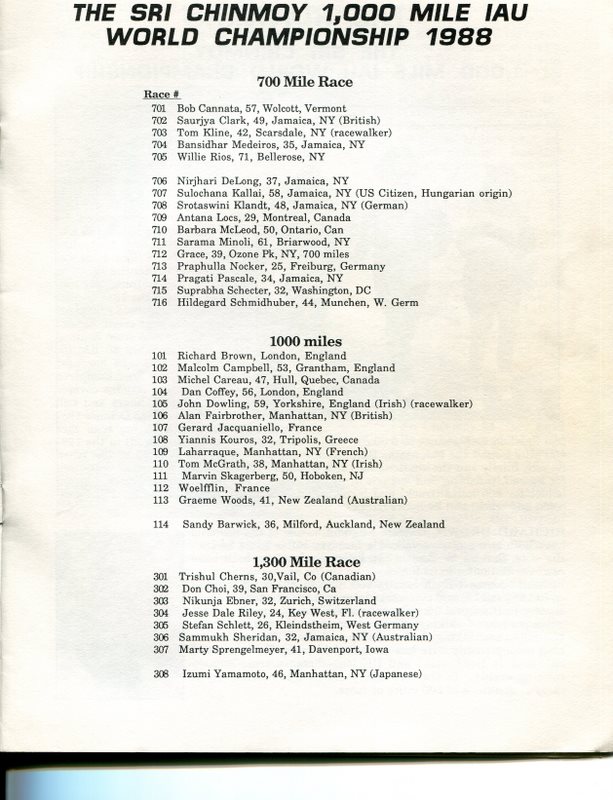
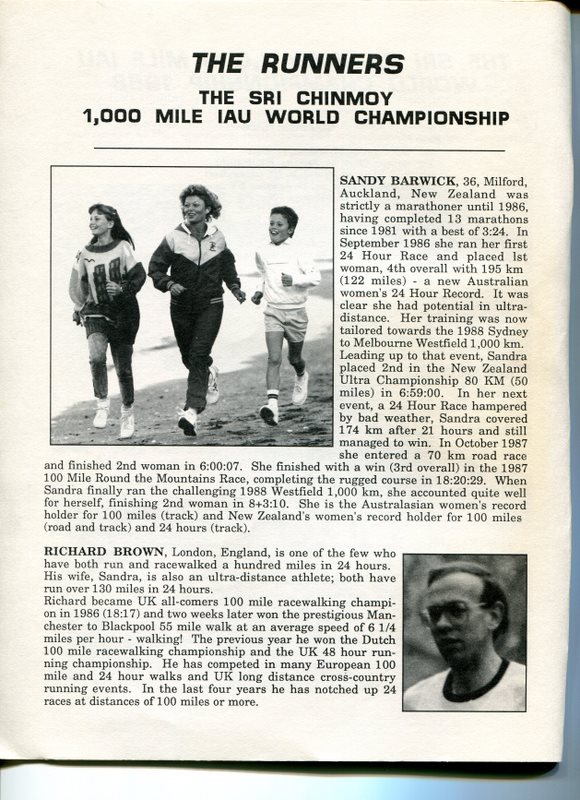
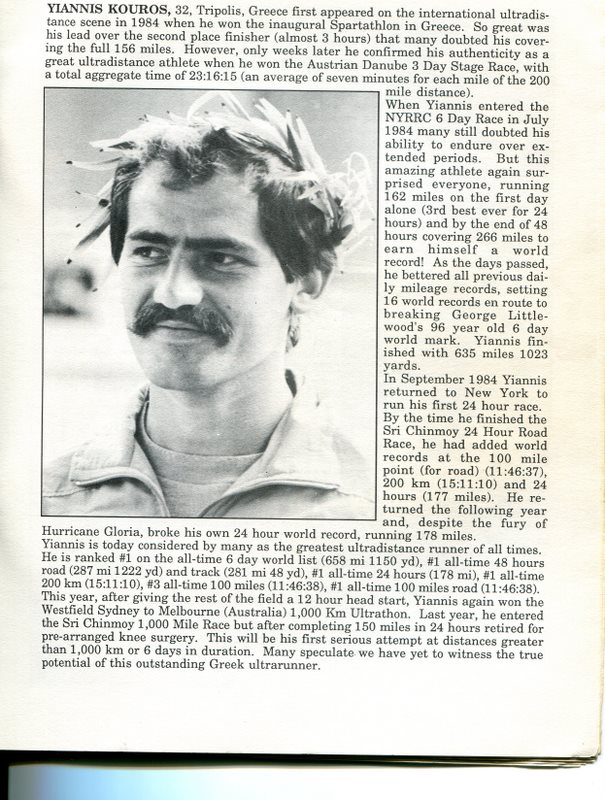
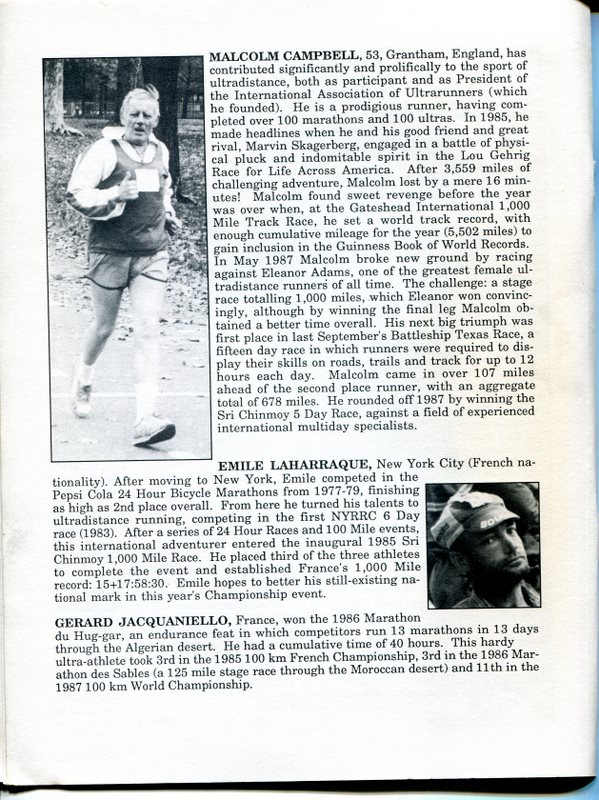
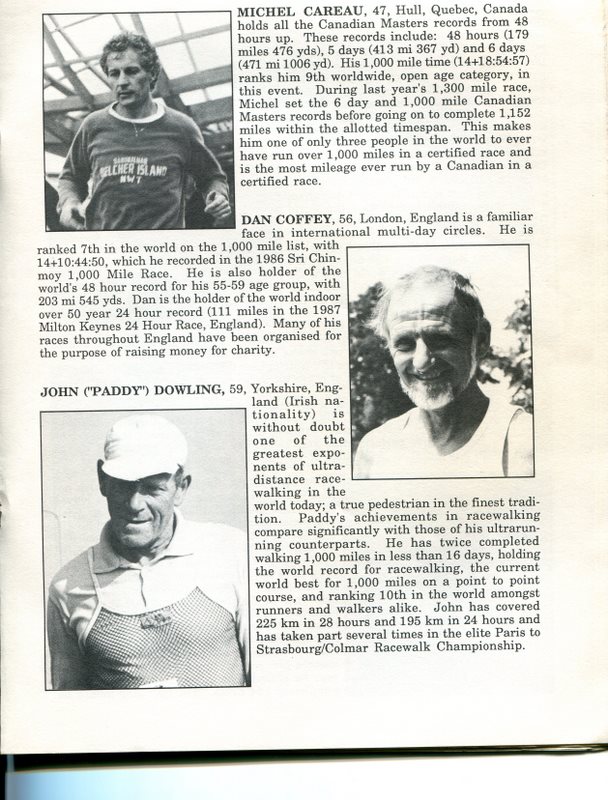
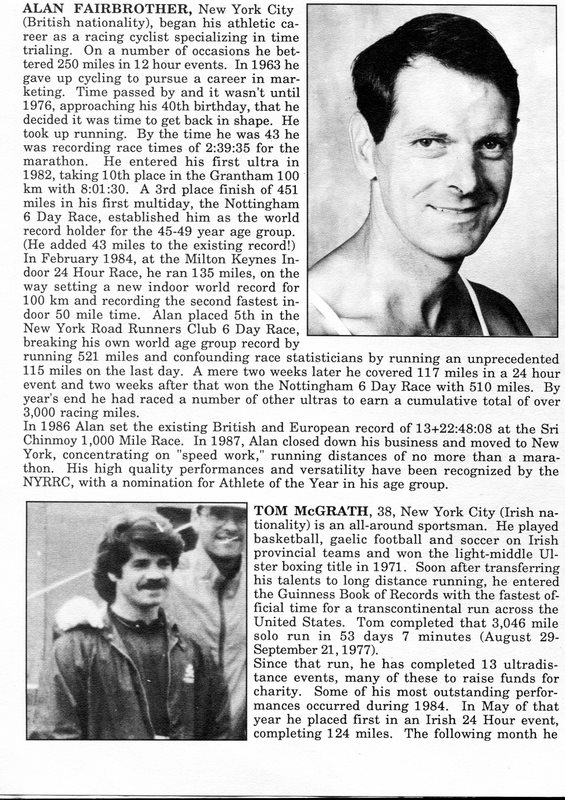
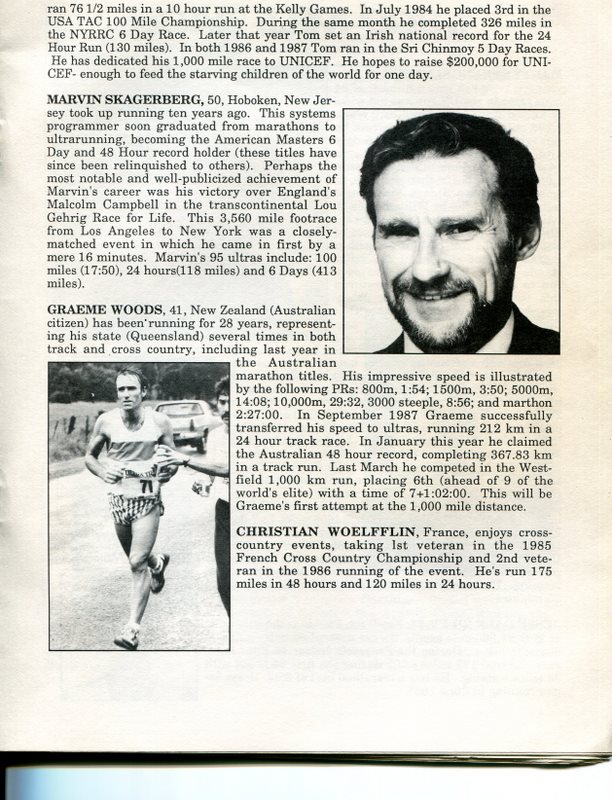
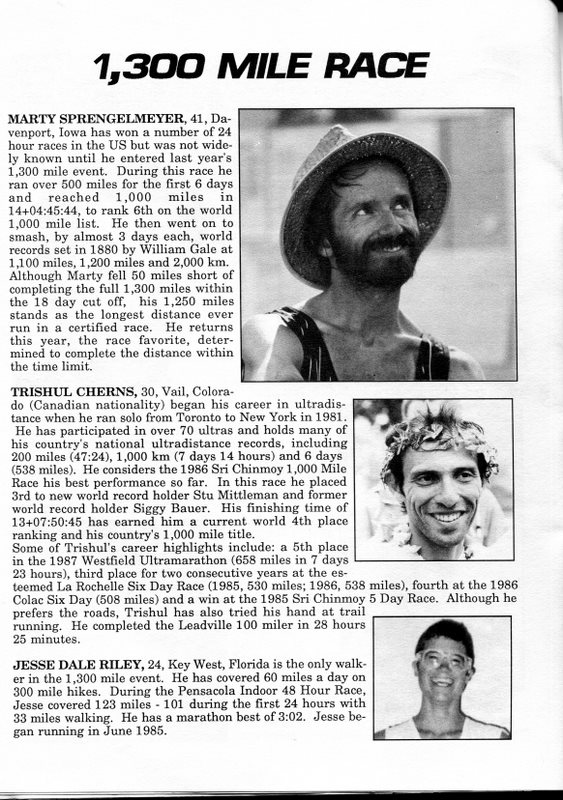
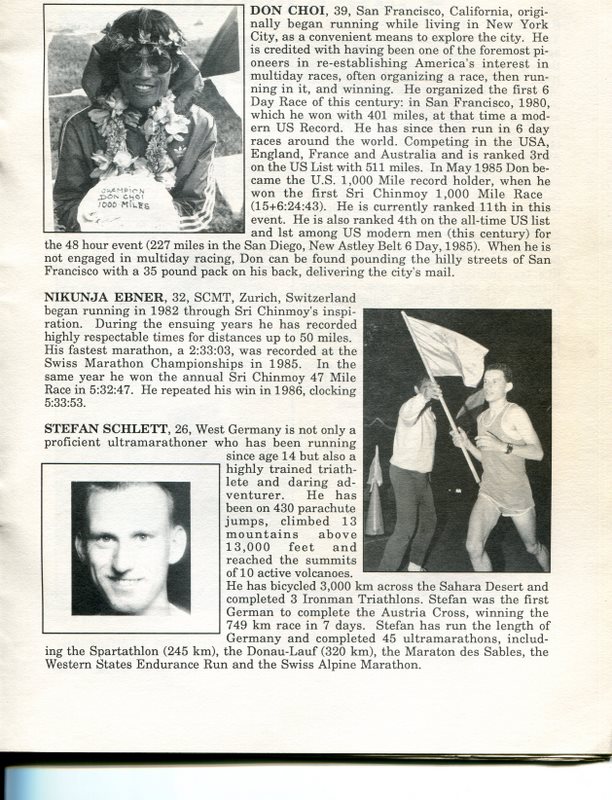
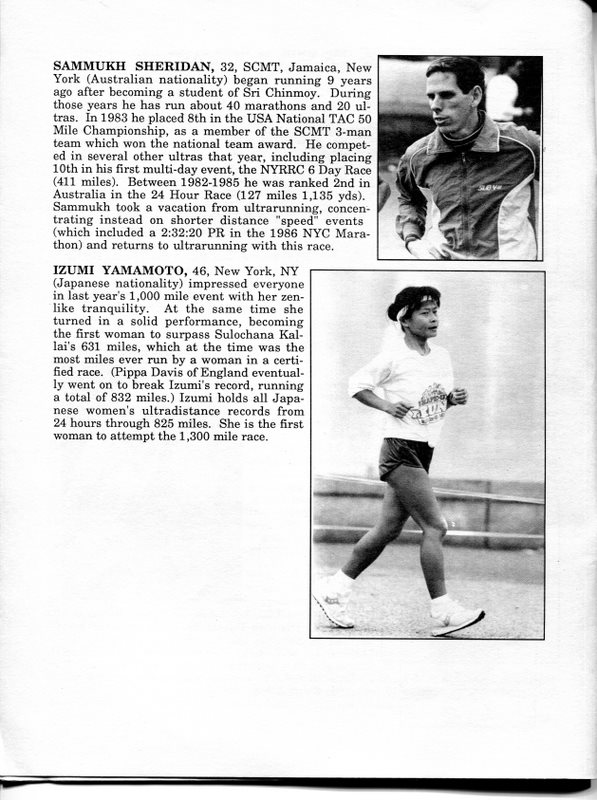
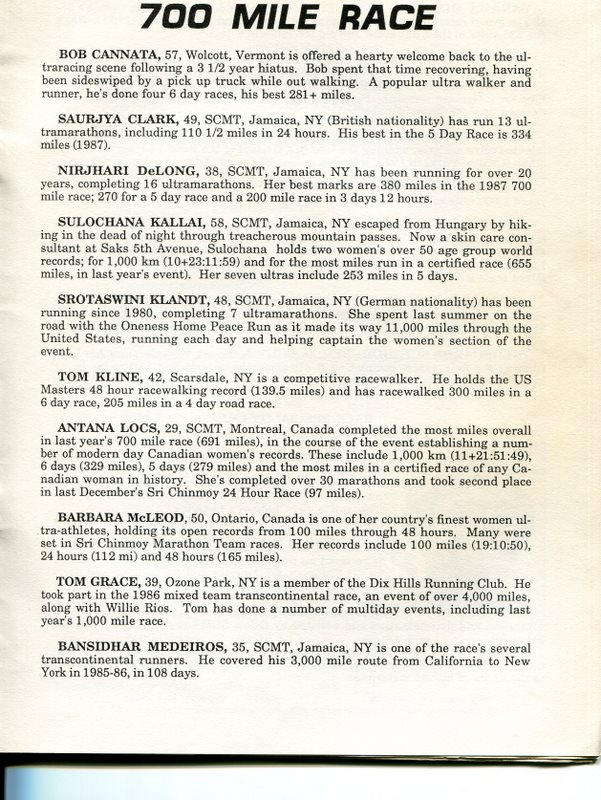
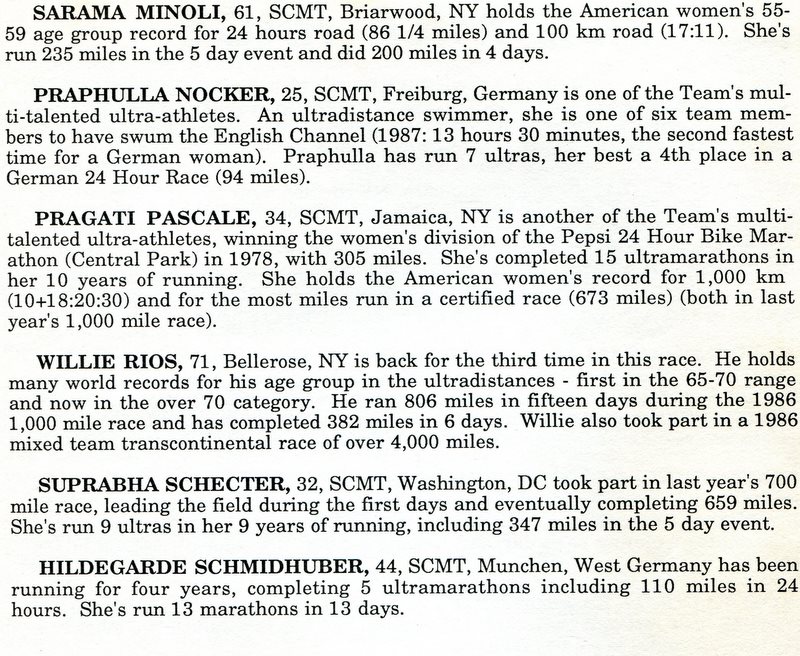
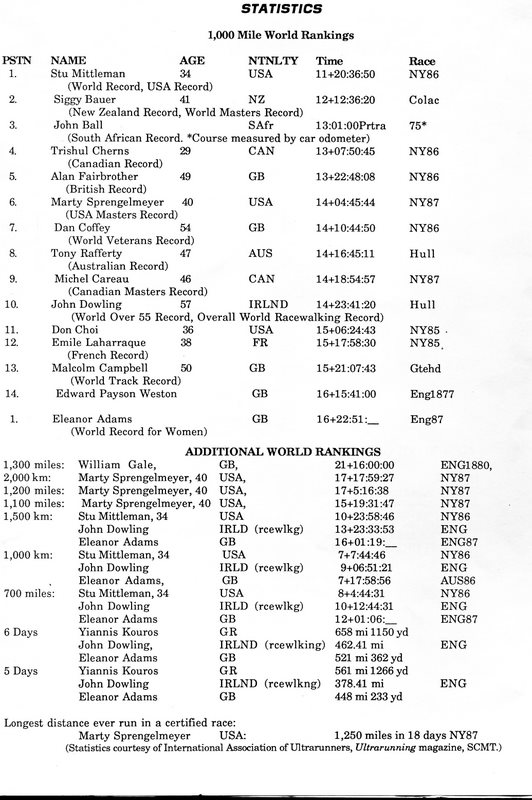
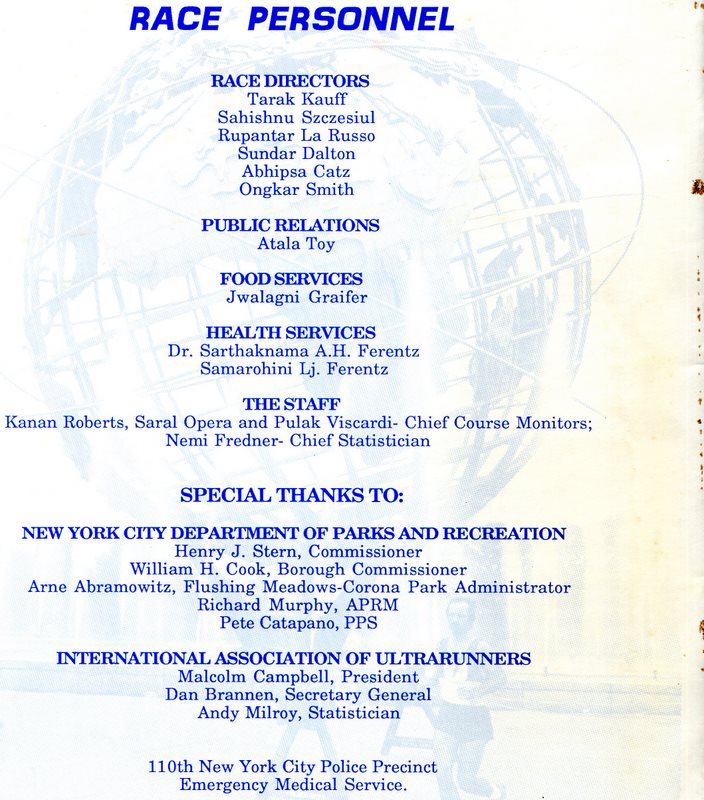
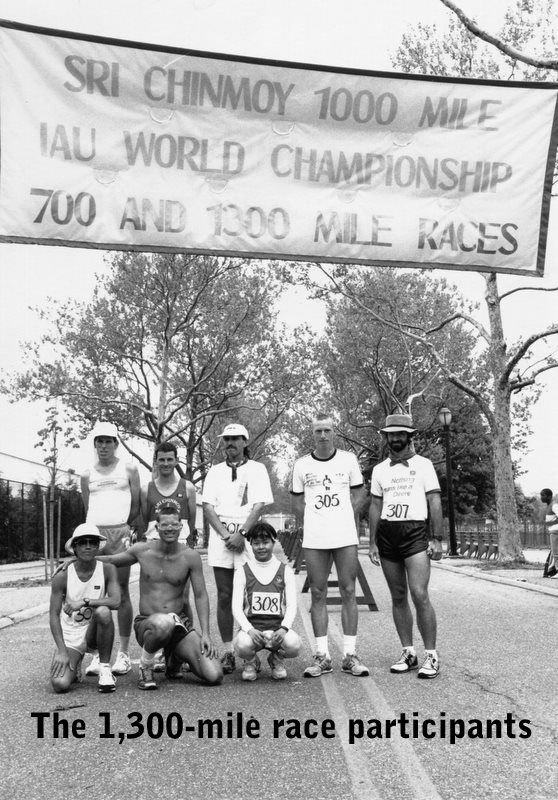
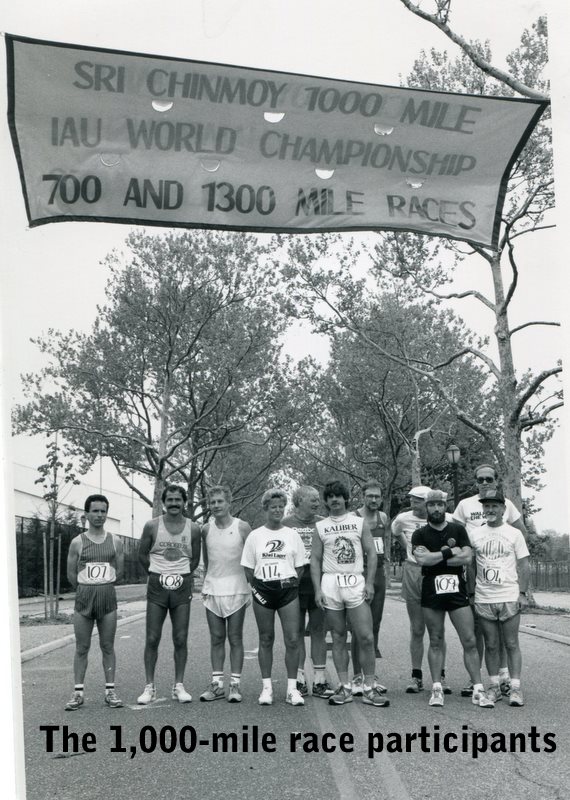
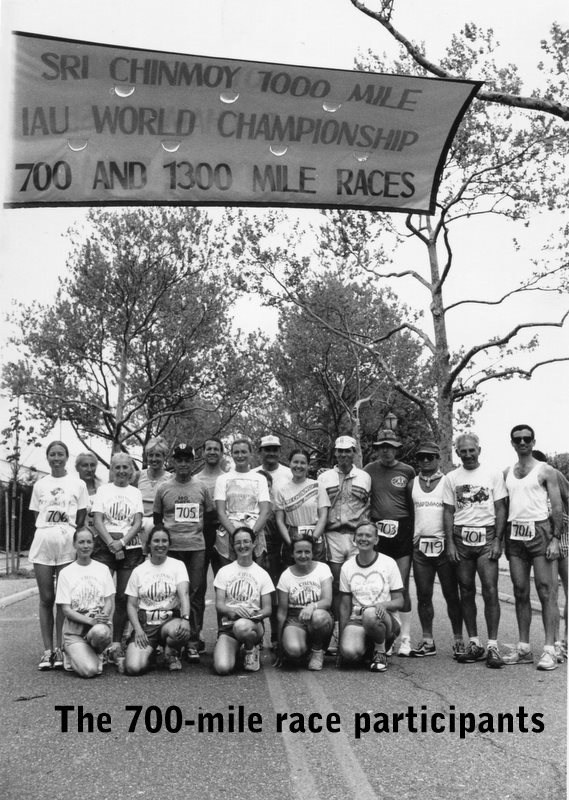
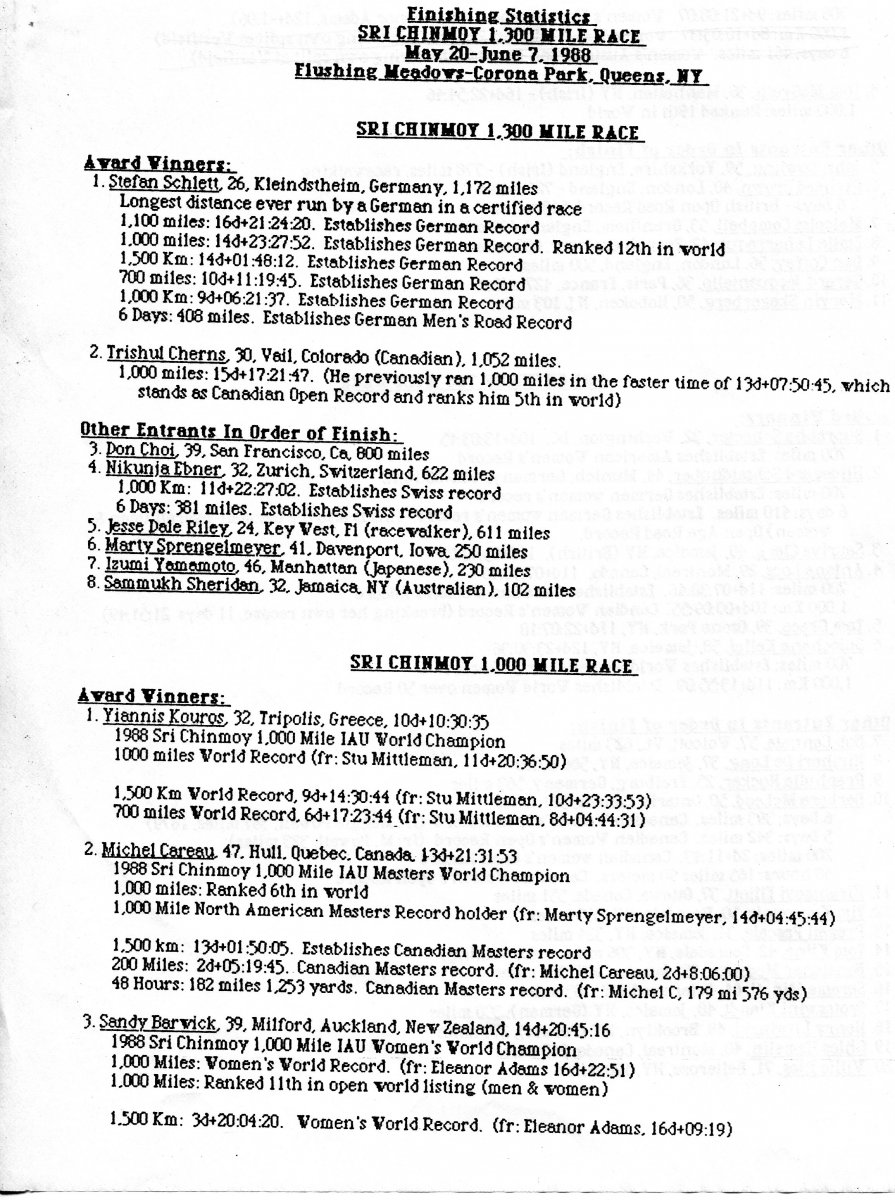
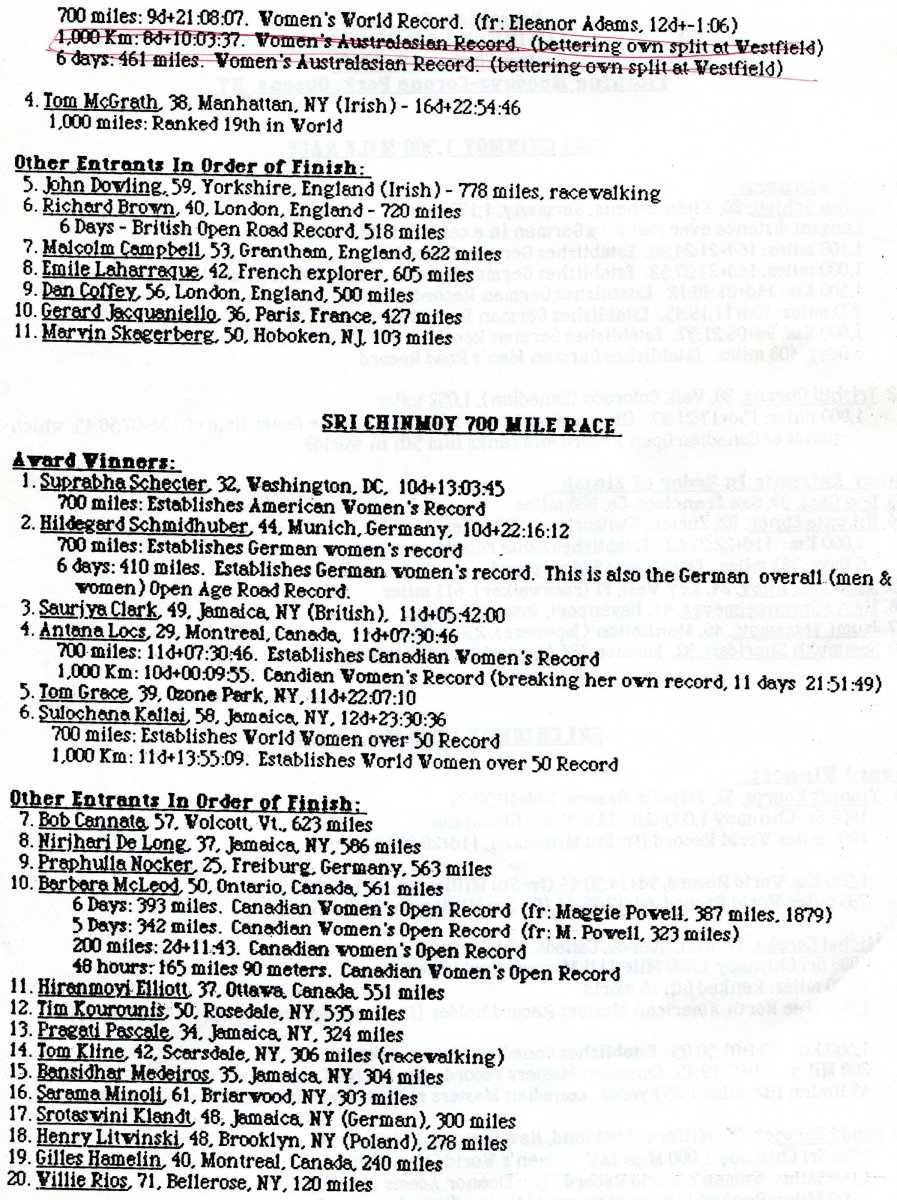
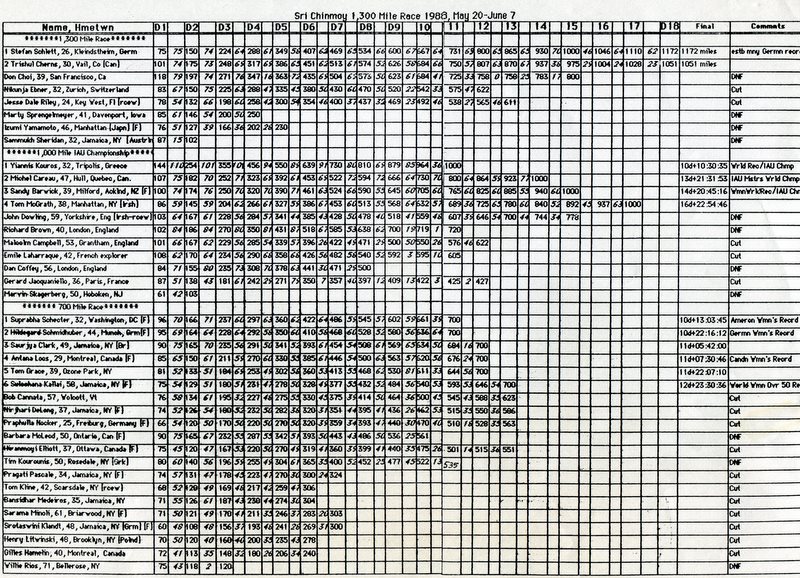
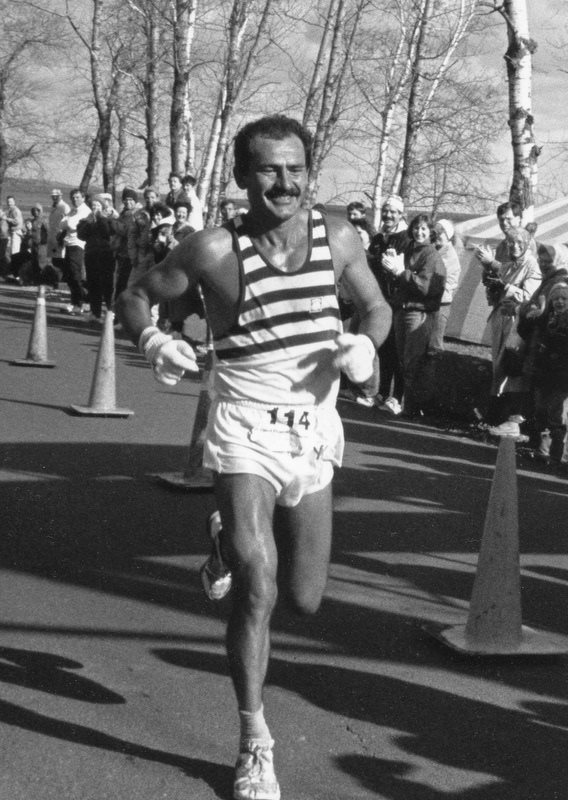 "YIANNIS KOUROS, 32, Tripolis, Greece first appeared on the international ultra distance scene in 1984 when he won the inaugural Spartathlon in Greece. So great was his lead over the second place finisher (almost 3 hours) that many doubted his covering the full 156 miles. However, only weeks later he confirmed his authenticity as a great ultra distance athlete when he won the Austrian Danube 3 Day Stage Race, with a total aggregate time of 23:16:15 (an average of seven minutes for each mile of the 200 mile distance).
"YIANNIS KOUROS, 32, Tripolis, Greece first appeared on the international ultra distance scene in 1984 when he won the inaugural Spartathlon in Greece. So great was his lead over the second place finisher (almost 3 hours) that many doubted his covering the full 156 miles. However, only weeks later he confirmed his authenticity as a great ultra distance athlete when he won the Austrian Danube 3 Day Stage Race, with a total aggregate time of 23:16:15 (an average of seven minutes for each mile of the 200 mile distance).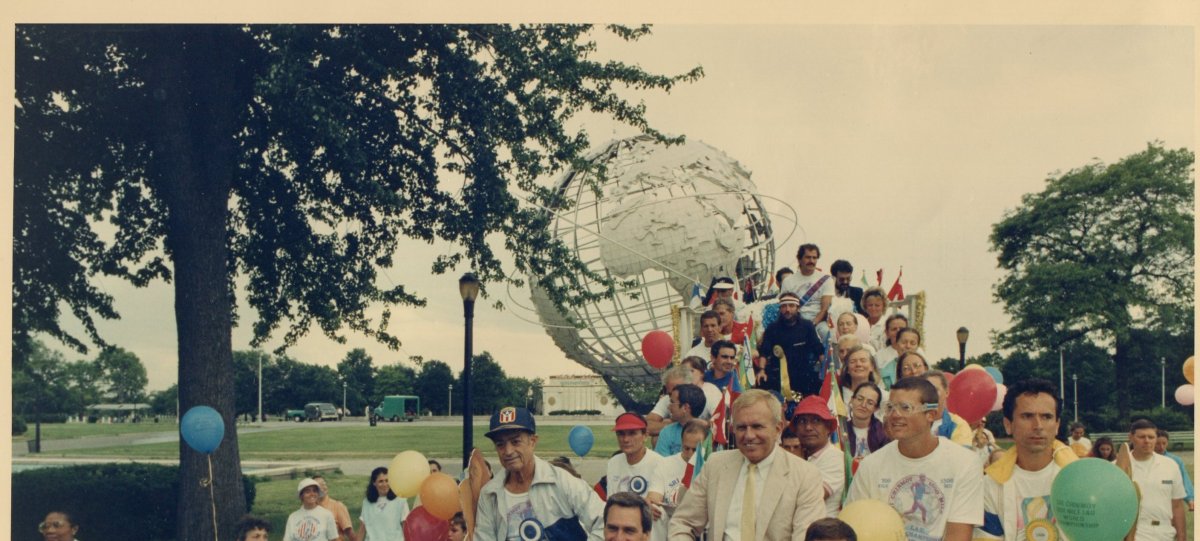

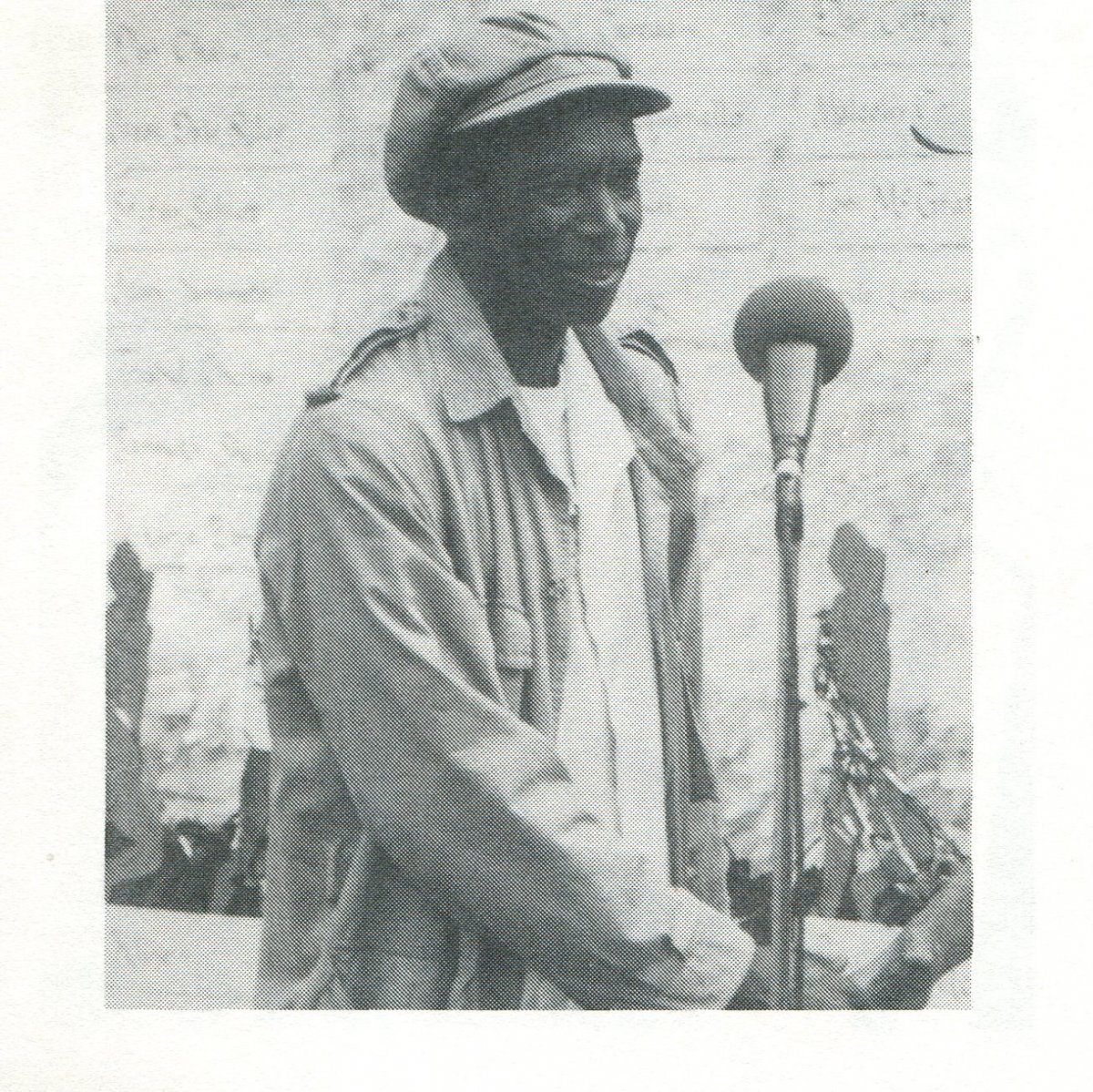
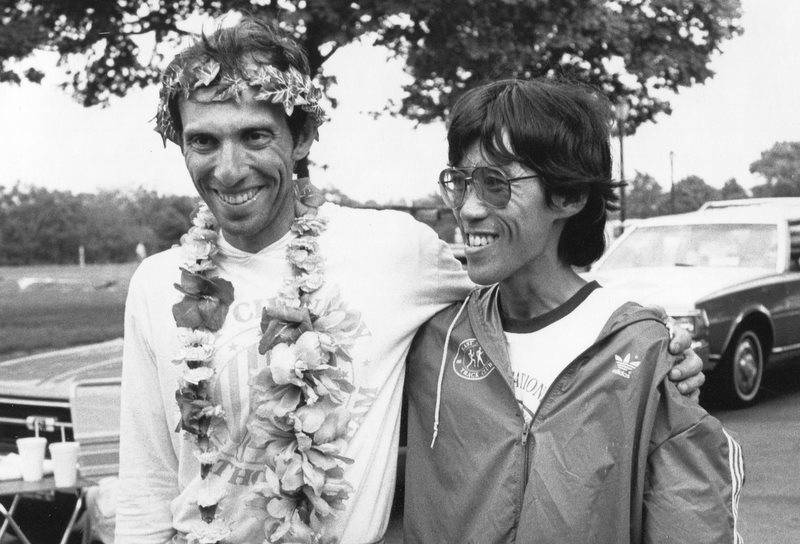
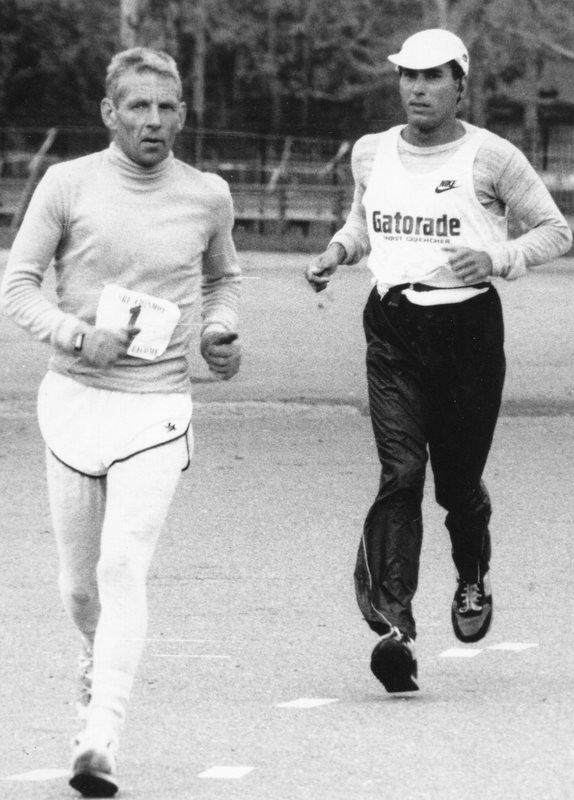 Fred Lebow took an interests in the Six Day Race and became determined that the first man to best Littlewood's record would do so in New York. The New York Road Runners club organized two Six Day Races and the first of these was held in 1983. The race winner, Siegfried Bauer, completed 511 miles which was a better performance than the mileage indicates. The temperature during the entire race was particularly hot.
Fred Lebow took an interests in the Six Day Race and became determined that the first man to best Littlewood's record would do so in New York. The New York Road Runners club organized two Six Day Races and the first of these was held in 1983. The race winner, Siegfried Bauer, completed 511 miles which was a better performance than the mileage indicates. The temperature during the entire race was particularly hot.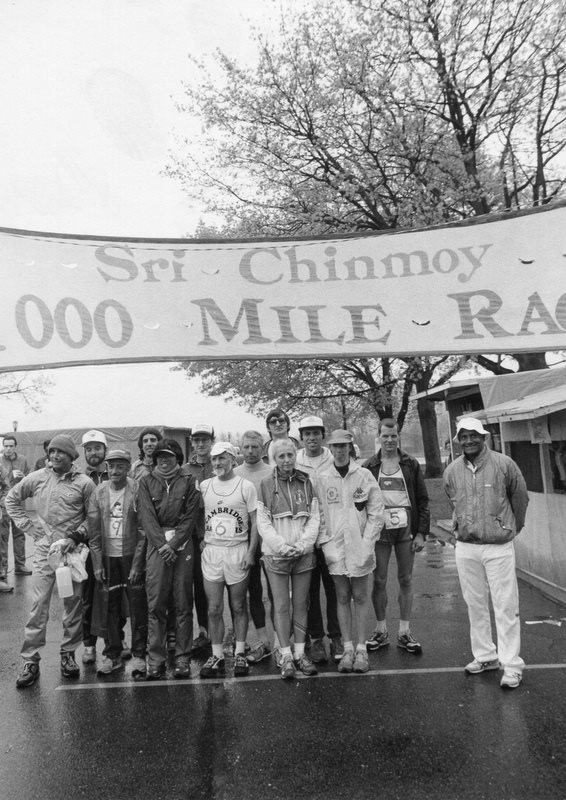 Meanwhile, a new event had emerged on the multi day calendar. The 1,000 mile race! In the 1970s there had been a two-man challenge between John Ball of South Africa and Siegfried Bauer from New Zealand. Bauer won this race which took place in South Africa and he was to win over the same distance in Colac (Australia) in 1983 with a time of 12 days, 12 hours, 36 minutes. This race started in Melbourne and the competitors ran to Colac, a distance of about 92 miles, where they continued around an accurately marked circuit in the Memorial Square of the Town. In 1985, the Sri Chinmoy Marathon Team in New York organized a 1,000 mile road race in Flushing Meadows Park, Queens, New York. That great pioneer of multi day racing, Don Choi, was still around and it seemed most appropriate that he should win this inaugural event. His winning time was 15 days, 6 hours, 24 minutes. In the same year, a 1,000 mile track race at Gateshead in England was won by Malcolm Campbell with a time of 15 days, 21 hours, 7 minutes. This had been the first 1,000 mile track race for nearly a century and, unlike the old 6 day records, the old 1,000 mile track times were quite modest. The Australian runner, Tony Rafferty, won a 1,000 mile road race in England in 1986 with a time of 14 days, 16 hours, 45 minutes. An outstanding 1,000 mile run was produced by the American, Stu Mittleman, at Flushing Meadow (a Sri Chinmoy Marathon Team race) in 1986 when he finished 25 hours in front of the second place runner with a time of 11 days, 20 hours, 37 minutes. Mittleman’s record for 1,000 miles seemed secure against all known competitors over the distance, and posed certain questions for outstanding performers over lesser distances.
Meanwhile, a new event had emerged on the multi day calendar. The 1,000 mile race! In the 1970s there had been a two-man challenge between John Ball of South Africa and Siegfried Bauer from New Zealand. Bauer won this race which took place in South Africa and he was to win over the same distance in Colac (Australia) in 1983 with a time of 12 days, 12 hours, 36 minutes. This race started in Melbourne and the competitors ran to Colac, a distance of about 92 miles, where they continued around an accurately marked circuit in the Memorial Square of the Town. In 1985, the Sri Chinmoy Marathon Team in New York organized a 1,000 mile road race in Flushing Meadows Park, Queens, New York. That great pioneer of multi day racing, Don Choi, was still around and it seemed most appropriate that he should win this inaugural event. His winning time was 15 days, 6 hours, 24 minutes. In the same year, a 1,000 mile track race at Gateshead in England was won by Malcolm Campbell with a time of 15 days, 21 hours, 7 minutes. This had been the first 1,000 mile track race for nearly a century and, unlike the old 6 day records, the old 1,000 mile track times were quite modest. The Australian runner, Tony Rafferty, won a 1,000 mile road race in England in 1986 with a time of 14 days, 16 hours, 45 minutes. An outstanding 1,000 mile run was produced by the American, Stu Mittleman, at Flushing Meadow (a Sri Chinmoy Marathon Team race) in 1986 when he finished 25 hours in front of the second place runner with a time of 11 days, 20 hours, 37 minutes. Mittleman’s record for 1,000 miles seemed secure against all known competitors over the distance, and posed certain questions for outstanding performers over lesser distances.